



Our main speakers this year cover an exciting array of topics throughout the various sessions in our programme. Click on the images below to learn more.
 Karen has over 15 years of experience in the field of RNA therapeutics. She studied biochemistry at the University of Leeds followed by a PhD in neuroscience (on tau RNA processing in neurodegeneration) at the Institute of Psychiatry, King’s College London. As a post-doc at King’s she established proof-of-concept for RNA reprogramming strategies including RNA trans-splicing therapies for spinocerebellar ataxia type 1 and the tauopathies. Later, working with Professor Francesco Muntoni at the Institute of Child Health, University College London, she played a key role in developing antisense oligonucleotide-mediated exon skipping as a therapeutic strategy for Duchenne muscular dystrophy (DMD). Her pre-clinical and clinical work in this area culminated in the first FDA-approved drug for DMD. In 2015, Karen attained a lectureship at the University of Northampton, where she is now a Professor of Molecular Medicine and co-leads the Centre for Physical Activity and Life Sciences. At Northampton, Karen’s research has diversified into fields such as cancer while retaining a focus on the neuropathophysiology of DMD and spinocerebellar ataxia. She is currently leading collaborative projects on RNA trans-splicing for rare neurological diseases. In addition to research, she manages significant teaching and management responsibilities and leads initiatives to enhance regional research infrastructure, culture, and environment.
Karen has over 15 years of experience in the field of RNA therapeutics. She studied biochemistry at the University of Leeds followed by a PhD in neuroscience (on tau RNA processing in neurodegeneration) at the Institute of Psychiatry, King’s College London. As a post-doc at King’s she established proof-of-concept for RNA reprogramming strategies including RNA trans-splicing therapies for spinocerebellar ataxia type 1 and the tauopathies. Later, working with Professor Francesco Muntoni at the Institute of Child Health, University College London, she played a key role in developing antisense oligonucleotide-mediated exon skipping as a therapeutic strategy for Duchenne muscular dystrophy (DMD). Her pre-clinical and clinical work in this area culminated in the first FDA-approved drug for DMD. In 2015, Karen attained a lectureship at the University of Northampton, where she is now a Professor of Molecular Medicine and co-leads the Centre for Physical Activity and Life Sciences. At Northampton, Karen’s research has diversified into fields such as cancer while retaining a focus on the neuropathophysiology of DMD and spinocerebellar ataxia. She is currently leading collaborative projects on RNA trans-splicing for rare neurological diseases. In addition to research, she manages significant teaching and management responsibilities and leads initiatives to enhance regional research infrastructure, culture, and environment.
 Karen has over 15 years of experience in the field of RNA therapeutics. She studied biochemistry at the University of Leeds followed by a PhD in neuroscience (on tau RNA processing in neurodegeneration) at the Institute of Psychiatry, King’s College London. As a post-doc at King’s she established proof-of-concept for RNA reprogramming strategies including RNA trans-splicing therapies for spinocerebellar ataxia type 1 and the tauopathies. Later, working with Professor Francesco Muntoni at the Institute of Child Health, University College London, she played a key role in developing antisense oligonucleotide-mediated exon skipping as a therapeutic strategy for Duchenne muscular dystrophy (DMD). Her pre-clinical and clinical work in this area culminated in the first FDA-approved drug for DMD. In 2015, Karen attained a lectureship at the University of Northampton, where she is now a Professor of Molecular Medicine and co-leads the Centre for Physical Activity and Life Sciences. At Northampton, Karen’s research has diversified into fields such as cancer while retaining a focus on the neuropathophysiology of DMD and spinocerebellar ataxia. She is currently leading collaborative projects on RNA trans-splicing for rare neurological diseases. In addition to research, she manages significant teaching and management responsibilities and leads initiatives to enhance regional research infrastructure, culture, and environment.
Karen has over 15 years of experience in the field of RNA therapeutics. She studied biochemistry at the University of Leeds followed by a PhD in neuroscience (on tau RNA processing in neurodegeneration) at the Institute of Psychiatry, King’s College London. As a post-doc at King’s she established proof-of-concept for RNA reprogramming strategies including RNA trans-splicing therapies for spinocerebellar ataxia type 1 and the tauopathies. Later, working with Professor Francesco Muntoni at the Institute of Child Health, University College London, she played a key role in developing antisense oligonucleotide-mediated exon skipping as a therapeutic strategy for Duchenne muscular dystrophy (DMD). Her pre-clinical and clinical work in this area culminated in the first FDA-approved drug for DMD. In 2015, Karen attained a lectureship at the University of Northampton, where she is now a Professor of Molecular Medicine and co-leads the Centre for Physical Activity and Life Sciences. At Northampton, Karen’s research has diversified into fields such as cancer while retaining a focus on the neuropathophysiology of DMD and spinocerebellar ataxia. She is currently leading collaborative projects on RNA trans-splicing for rare neurological diseases. In addition to research, she manages significant teaching and management responsibilities and leads initiatives to enhance regional research infrastructure, culture, and environment.
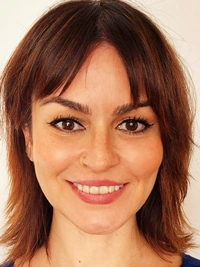 Dr. Eider Arenaza-Urquijo is an Assistant Professor at the Barcelona Institute for Global Health (ISGlobal) and the University Pompeu Fabra in Barcelona, Spain. She leads the Alzheimer's Prevention and Healthy Ageing Group, where her research focuses on understanding the brain mechanisms and modifiable factors that contribute to cognitive resilience in aging and Alzheimer's disease.
Dr. Eider Arenaza-Urquijo is an Assistant Professor at the Barcelona Institute for Global Health (ISGlobal) and the University Pompeu Fabra in Barcelona, Spain. She leads the Alzheimer's Prevention and Healthy Ageing Group, where her research focuses on understanding the brain mechanisms and modifiable factors that contribute to cognitive resilience in aging and Alzheimer's disease.
Dr. Arenaza-Urquijo has made significant contributions to the scientific and theoretical understanding of resilience in aging and Alzheimer's disease. Her work includes identifying the impact of factors such as higher education, mental health issues (including anxiety, depression, and stress exposure), as well as physical and cognitive activities on cognitive resilience. She highlights the critical role of sex and gender differences in resilience research, particularly regarding modifiable risk factors, immune responses and inflammation. Through this approach, her research aims to deepen our understanding of resilience mechanisms and inform the development of preventive strategies for Alzheimer's disease and related cognitive disorders.
Currently, Dr. Arenaza-Urquijois the President of the 'Reserve, Resilience, and Protective Factors' group within the International Society to Advance Research and Treatment of Alzheimer's Disease and Related Disorders (ISTAART), a professional society of the Alzheimer's Association.
 Dr. Eider Arenaza-Urquijo is an Assistant Professor at the Barcelona Institute for Global Health (ISGlobal) and the University Pompeu Fabra in Barcelona, Spain. She leads the Alzheimer's Prevention and Healthy Ageing Group, where her research focuses on understanding the brain mechanisms and modifiable factors that contribute to cognitive resilience in aging and Alzheimer's disease.
Dr. Eider Arenaza-Urquijo is an Assistant Professor at the Barcelona Institute for Global Health (ISGlobal) and the University Pompeu Fabra in Barcelona, Spain. She leads the Alzheimer's Prevention and Healthy Ageing Group, where her research focuses on understanding the brain mechanisms and modifiable factors that contribute to cognitive resilience in aging and Alzheimer's disease.
Dr. Arenaza-Urquijo has made significant contributions to the scientific and theoretical understanding of resilience in aging and Alzheimer's disease. Her work includes identifying the impact of factors such as higher education, mental health issues (including anxiety, depression, and stress exposure), as well as physical and cognitive activities on cognitive resilience. She highlights the critical role of sex and gender differences in resilience research, particularly regarding modifiable risk factors, immune responses and inflammation. Through this approach, her research aims to deepen our understanding of resilience mechanisms and inform the development of preventive strategies for Alzheimer's disease and related cognitive disorders.
Currently, Dr. Arenaza-Urquijois the President of the 'Reserve, Resilience, and Protective Factors' group within the International Society to Advance Research and Treatment of Alzheimer's Disease and Related Disorders (ISTAART), a professional society of the Alzheimer's Association.
 I am a Principal Investigator at the Department of Fundamental Neurosciences (DNF) at the University of Lausanne (UNIL, Switzerland) and an Associate Professor at the Department of Physiology and Pharmacology at the University of Rome Sapienza (Italy). My research focuses on understanding the role of astrocyte-neuron communication in postnatal brain development, both in physiological and pathological conditions. With over 20 years of experience studying the cellular and physiological properties of astrocytes, my laboratory has significantly advanced our understanding of astrocyte-neuron interactions, particularly the intra- and extracellular signaling events that ensure proper communication with other brain cell types. This work has resulted in more than 50 publications in prestigious international peer-reviewed journals, including Nature, Nature Neuroscience, Molecular Psychiatry, and Biological Psychiatry. Over the last ten years, I have been invited to give more than 20 talks at conferences and institutions worldwide. I regularly serve as a reviewer for leading journals such as Nature Neuroscience, Biological Psychiatry, Nature Communications, Molecular Psychiatry, Neuron and JCB. Additionally, I review grants for prestigious international funding agencies including the Wellcome Trust, ERC Starting Grant, DFG, and ARSEP/EDMUS, and have been a member of the ERANET Neurons evaluation panels. I currently serve on the Scientific Advisory Board for two neuroscience departments in France.
Throughout my career, I have secured several competitive grants, including from the ERANET Neuron and the Telethon Foundation Italy. I have supervised more than 10 master’s students and 8 PhD students and teach neuroscience and physiology to both medical and biomedical students in Switzerland and Italy.
I am a Principal Investigator at the Department of Fundamental Neurosciences (DNF) at the University of Lausanne (UNIL, Switzerland) and an Associate Professor at the Department of Physiology and Pharmacology at the University of Rome Sapienza (Italy). My research focuses on understanding the role of astrocyte-neuron communication in postnatal brain development, both in physiological and pathological conditions. With over 20 years of experience studying the cellular and physiological properties of astrocytes, my laboratory has significantly advanced our understanding of astrocyte-neuron interactions, particularly the intra- and extracellular signaling events that ensure proper communication with other brain cell types. This work has resulted in more than 50 publications in prestigious international peer-reviewed journals, including Nature, Nature Neuroscience, Molecular Psychiatry, and Biological Psychiatry. Over the last ten years, I have been invited to give more than 20 talks at conferences and institutions worldwide. I regularly serve as a reviewer for leading journals such as Nature Neuroscience, Biological Psychiatry, Nature Communications, Molecular Psychiatry, Neuron and JCB. Additionally, I review grants for prestigious international funding agencies including the Wellcome Trust, ERC Starting Grant, DFG, and ARSEP/EDMUS, and have been a member of the ERANET Neurons evaluation panels. I currently serve on the Scientific Advisory Board for two neuroscience departments in France.
Throughout my career, I have secured several competitive grants, including from the ERANET Neuron and the Telethon Foundation Italy. I have supervised more than 10 master’s students and 8 PhD students and teach neuroscience and physiology to both medical and biomedical students in Switzerland and Italy.
 I am a Principal Investigator at the Department of Fundamental Neurosciences (DNF) at the University of Lausanne (UNIL, Switzerland) and an Associate Professor at the Department of Physiology and Pharmacology at the University of Rome Sapienza (Italy). My research focuses on understanding the role of astrocyte-neuron communication in postnatal brain development, both in physiological and pathological conditions. With over 20 years of experience studying the cellular and physiological properties of astrocytes, my laboratory has significantly advanced our understanding of astrocyte-neuron interactions, particularly the intra- and extracellular signaling events that ensure proper communication with other brain cell types. This work has resulted in more than 50 publications in prestigious international peer-reviewed journals, including Nature, Nature Neuroscience, Molecular Psychiatry, and Biological Psychiatry. Over the last ten years, I have been invited to give more than 20 talks at conferences and institutions worldwide. I regularly serve as a reviewer for leading journals such as Nature Neuroscience, Biological Psychiatry, Nature Communications, Molecular Psychiatry, Neuron and JCB. Additionally, I review grants for prestigious international funding agencies including the Wellcome Trust, ERC Starting Grant, DFG, and ARSEP/EDMUS, and have been a member of the ERANET Neurons evaluation panels. I currently serve on the Scientific Advisory Board for two neuroscience departments in France.
Throughout my career, I have secured several competitive grants, including from the ERANET Neuron and the Telethon Foundation Italy. I have supervised more than 10 master’s students and 8 PhD students and teach neuroscience and physiology to both medical and biomedical students in Switzerland and Italy.
I am a Principal Investigator at the Department of Fundamental Neurosciences (DNF) at the University of Lausanne (UNIL, Switzerland) and an Associate Professor at the Department of Physiology and Pharmacology at the University of Rome Sapienza (Italy). My research focuses on understanding the role of astrocyte-neuron communication in postnatal brain development, both in physiological and pathological conditions. With over 20 years of experience studying the cellular and physiological properties of astrocytes, my laboratory has significantly advanced our understanding of astrocyte-neuron interactions, particularly the intra- and extracellular signaling events that ensure proper communication with other brain cell types. This work has resulted in more than 50 publications in prestigious international peer-reviewed journals, including Nature, Nature Neuroscience, Molecular Psychiatry, and Biological Psychiatry. Over the last ten years, I have been invited to give more than 20 talks at conferences and institutions worldwide. I regularly serve as a reviewer for leading journals such as Nature Neuroscience, Biological Psychiatry, Nature Communications, Molecular Psychiatry, Neuron and JCB. Additionally, I review grants for prestigious international funding agencies including the Wellcome Trust, ERC Starting Grant, DFG, and ARSEP/EDMUS, and have been a member of the ERANET Neurons evaluation panels. I currently serve on the Scientific Advisory Board for two neuroscience departments in France.
Throughout my career, I have secured several competitive grants, including from the ERANET Neuron and the Telethon Foundation Italy. I have supervised more than 10 master’s students and 8 PhD students and teach neuroscience and physiology to both medical and biomedical students in Switzerland and Italy.
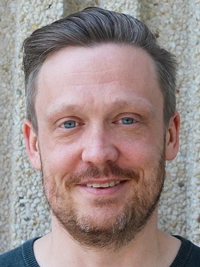 Jeroen Bogie was born in 1983 and grew up in Geleen, the Netherlands. He received his MSc degree in biomedical sciences from Amsterdam university (2002-2008), and subsequently received his PhD in neuroimmunology from Hasselt University (2009-2013), under the supervision of Piet Stinissen, Niels Hellings, and Jerome Hendriks. During his PhD, he defined the physiology of macrophages in multiple sclerosis (MS) and established that uptake and processing of lipids is pivotal in skewing macrophages towards a neuroprotective phenotype. As a junior and senior FWO postdoctoral fellow at Rotterdam, Lille, Chulalongkorn, and Hasselt University, Jeroen studied the impact of lipid metabolism on the functional properties of immune and glial cells in neuroinflammatory and neurodegenerative disorders such as MS and Alzheimer’s disease (2014-2021). In 2021, Jeroen accepted an assistant professor position at Hasselt University. Here, he currently heads the Medical Biochemistry and Immunology Lab (www.bogielab.com) and aims to further investigate the metabolic blueprint of neurodegenerative and rare auto-inflammatory disorders. Jeroen is currently co-heading the animal facility and neurometabolic work group, a member of the capacity group ‘Immunology & Infection’ and faculty board Life Sciences, and actively involved in the BSc and MSc curriculum of UH. His research is funded by FWO, Charcot Stichting, Interreg, MS liga, GSKE, and BOF Uhasselt.
Jeroen Bogie was born in 1983 and grew up in Geleen, the Netherlands. He received his MSc degree in biomedical sciences from Amsterdam university (2002-2008), and subsequently received his PhD in neuroimmunology from Hasselt University (2009-2013), under the supervision of Piet Stinissen, Niels Hellings, and Jerome Hendriks. During his PhD, he defined the physiology of macrophages in multiple sclerosis (MS) and established that uptake and processing of lipids is pivotal in skewing macrophages towards a neuroprotective phenotype. As a junior and senior FWO postdoctoral fellow at Rotterdam, Lille, Chulalongkorn, and Hasselt University, Jeroen studied the impact of lipid metabolism on the functional properties of immune and glial cells in neuroinflammatory and neurodegenerative disorders such as MS and Alzheimer’s disease (2014-2021). In 2021, Jeroen accepted an assistant professor position at Hasselt University. Here, he currently heads the Medical Biochemistry and Immunology Lab (www.bogielab.com) and aims to further investigate the metabolic blueprint of neurodegenerative and rare auto-inflammatory disorders. Jeroen is currently co-heading the animal facility and neurometabolic work group, a member of the capacity group ‘Immunology & Infection’ and faculty board Life Sciences, and actively involved in the BSc and MSc curriculum of UH. His research is funded by FWO, Charcot Stichting, Interreg, MS liga, GSKE, and BOF Uhasselt.
 Jeroen Bogie was born in 1983 and grew up in Geleen, the Netherlands. He received his MSc degree in biomedical sciences from Amsterdam university (2002-2008), and subsequently received his PhD in neuroimmunology from Hasselt University (2009-2013), under the supervision of Piet Stinissen, Niels Hellings, and Jerome Hendriks. During his PhD, he defined the physiology of macrophages in multiple sclerosis (MS) and established that uptake and processing of lipids is pivotal in skewing macrophages towards a neuroprotective phenotype. As a junior and senior FWO postdoctoral fellow at Rotterdam, Lille, Chulalongkorn, and Hasselt University, Jeroen studied the impact of lipid metabolism on the functional properties of immune and glial cells in neuroinflammatory and neurodegenerative disorders such as MS and Alzheimer’s disease (2014-2021). In 2021, Jeroen accepted an assistant professor position at Hasselt University. Here, he currently heads the Medical Biochemistry and Immunology Lab (www.bogielab.com) and aims to further investigate the metabolic blueprint of neurodegenerative and rare auto-inflammatory disorders. Jeroen is currently co-heading the animal facility and neurometabolic work group, a member of the capacity group ‘Immunology & Infection’ and faculty board Life Sciences, and actively involved in the BSc and MSc curriculum of UH. His research is funded by FWO, Charcot Stichting, Interreg, MS liga, GSKE, and BOF Uhasselt.
Jeroen Bogie was born in 1983 and grew up in Geleen, the Netherlands. He received his MSc degree in biomedical sciences from Amsterdam university (2002-2008), and subsequently received his PhD in neuroimmunology from Hasselt University (2009-2013), under the supervision of Piet Stinissen, Niels Hellings, and Jerome Hendriks. During his PhD, he defined the physiology of macrophages in multiple sclerosis (MS) and established that uptake and processing of lipids is pivotal in skewing macrophages towards a neuroprotective phenotype. As a junior and senior FWO postdoctoral fellow at Rotterdam, Lille, Chulalongkorn, and Hasselt University, Jeroen studied the impact of lipid metabolism on the functional properties of immune and glial cells in neuroinflammatory and neurodegenerative disorders such as MS and Alzheimer’s disease (2014-2021). In 2021, Jeroen accepted an assistant professor position at Hasselt University. Here, he currently heads the Medical Biochemistry and Immunology Lab (www.bogielab.com) and aims to further investigate the metabolic blueprint of neurodegenerative and rare auto-inflammatory disorders. Jeroen is currently co-heading the animal facility and neurometabolic work group, a member of the capacity group ‘Immunology & Infection’ and faculty board Life Sciences, and actively involved in the BSc and MSc curriculum of UH. His research is funded by FWO, Charcot Stichting, Interreg, MS liga, GSKE, and BOF Uhasselt.
 I am a research director in Strasbourg, France. My research is exclusively devoted to motor neuron diseases, more specifically amyotrophic lateral sclerosis (ALS), a fatal neurodegenerative disease tcharacterized by progressive paralysis leading to death in 3 to 5 years after the first symptoms. Our work, as well as that of many other teams, has shown that ALS affects many different cell types throughout the body. In addition, we documented several non-motor signs in ALS patients, including weight loss or sleep defects. Over the past twenty years, my research has focused on these early non-motor signs, and led to significant conceptual advances that, for some of them, already have consequences in daily clinical practice. More recently, we have leveraged genetic approaches to understand ALS heterogeneity and begin to characterize genetic basis of ALS non motor signs.
I am a research director in Strasbourg, France. My research is exclusively devoted to motor neuron diseases, more specifically amyotrophic lateral sclerosis (ALS), a fatal neurodegenerative disease tcharacterized by progressive paralysis leading to death in 3 to 5 years after the first symptoms. Our work, as well as that of many other teams, has shown that ALS affects many different cell types throughout the body. In addition, we documented several non-motor signs in ALS patients, including weight loss or sleep defects. Over the past twenty years, my research has focused on these early non-motor signs, and led to significant conceptual advances that, for some of them, already have consequences in daily clinical practice. More recently, we have leveraged genetic approaches to understand ALS heterogeneity and begin to characterize genetic basis of ALS non motor signs.
 I am a research director in Strasbourg, France. My research is exclusively devoted to motor neuron diseases, more specifically amyotrophic lateral sclerosis (ALS), a fatal neurodegenerative disease tcharacterized by progressive paralysis leading to death in 3 to 5 years after the first symptoms. Our work, as well as that of many other teams, has shown that ALS affects many different cell types throughout the body. In addition, we documented several non-motor signs in ALS patients, including weight loss or sleep defects. Over the past twenty years, my research has focused on these early non-motor signs, and led to significant conceptual advances that, for some of them, already have consequences in daily clinical practice. More recently, we have leveraged genetic approaches to understand ALS heterogeneity and begin to characterize genetic basis of ALS non motor signs.
I am a research director in Strasbourg, France. My research is exclusively devoted to motor neuron diseases, more specifically amyotrophic lateral sclerosis (ALS), a fatal neurodegenerative disease tcharacterized by progressive paralysis leading to death in 3 to 5 years after the first symptoms. Our work, as well as that of many other teams, has shown that ALS affects many different cell types throughout the body. In addition, we documented several non-motor signs in ALS patients, including weight loss or sleep defects. Over the past twenty years, my research has focused on these early non-motor signs, and led to significant conceptual advances that, for some of them, already have consequences in daily clinical practice. More recently, we have leveraged genetic approaches to understand ALS heterogeneity and begin to characterize genetic basis of ALS non motor signs.
 Dr. Muriel Bruchhage is the director of the MANGO Brain Lab and an Associate Professor of Psychology and Head of the Bachelor Programme in Psychology at the University of Stavanger, Researcher II of Radiology at the Stavanger University Hospital and holds an affiliated position as Visiting Researcher at King’s College London.
Dr. Muriel Bruchhage is the director of the MANGO Brain Lab and an Associate Professor of Psychology and Head of the Bachelor Programme in Psychology at the University of Stavanger, Researcher II of Radiology at the Stavanger University Hospital and holds an affiliated position as Visiting Researcher at King’s College London.
For her postgraduate education, she received her Ph.D. from the Institute of Psychiatry, Psychology and Neuroscience at King’s College London focusing on the role of the cerebellum in atypical development, and completed her post-doctoral fellowship at Warren Alpert Medical School at Brown University using neuroimaging techniques to visualize early neurocognitive development throughout childhood.
Her research explores how adverse environments and factors of risk and resilience interact to shape brain and behavior development, inform disease development and progression as well as recovery from neurological injury. Using this framework, she is developing and validating new ultra-low field MRI system application in stroke and neurological pathologies, developing and applying different methods of neuromodelling to identify early adverse development, as well as developing AI informed methods and prediction models to enable easier translation into the clinic.
Dr Bruchhage’s research has been supported by funding from Helse Vest, the Waterloo Foundation, the Elsass NIBS Foundation, The Bill & Melinda Gates Foundation and the Wellcome Leap Program.
 Dr. Muriel Bruchhage is the director of the MANGO Brain Lab and an Associate Professor of Psychology and Head of the Bachelor Programme in Psychology at the University of Stavanger, Researcher II of Radiology at the Stavanger University Hospital and holds an affiliated position as Visiting Researcher at King’s College London.
Dr. Muriel Bruchhage is the director of the MANGO Brain Lab and an Associate Professor of Psychology and Head of the Bachelor Programme in Psychology at the University of Stavanger, Researcher II of Radiology at the Stavanger University Hospital and holds an affiliated position as Visiting Researcher at King’s College London.
For her postgraduate education, she received her Ph.D. from the Institute of Psychiatry, Psychology and Neuroscience at King’s College London focusing on the role of the cerebellum in atypical development, and completed her post-doctoral fellowship at Warren Alpert Medical School at Brown University using neuroimaging techniques to visualize early neurocognitive development throughout childhood.
Her research explores how adverse environments and factors of risk and resilience interact to shape brain and behavior development, inform disease development and progression as well as recovery from neurological injury. Using this framework, she is developing and validating new ultra-low field MRI system application in stroke and neurological pathologies, developing and applying different methods of neuromodelling to identify early adverse development, as well as developing AI informed methods and prediction models to enable easier translation into the clinic.
Dr Bruchhage’s research has been supported by funding from Helse Vest, the Waterloo Foundation, the Elsass NIBS Foundation, The Bill & Melinda Gates Foundation and the Wellcome Leap Program.
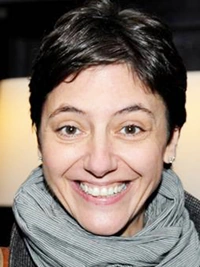 MB, MD PhD, is a child neurologist and neuropathologist currently affiliated to the Amsterdam university medical center. Her research focusses on leukodystrofies, the genetic diseases of the brain white matter, investigated from a broad perspective ranging from clinical phenotype to disease mechanisms and effects of novel therapies. Since the start of the COVID pandemics, MB has been actively involved in the collection of fatal and post-COVID brain tissue obtained at autopsy both in the Netherlands and abroad, building the largest COVID brain bank in Europe. This with the aim to identify whether COVID-19 is a concrete risk factor for the development of neurodegeneration later in life.
MB, MD PhD, is a child neurologist and neuropathologist currently affiliated to the Amsterdam university medical center. Her research focusses on leukodystrofies, the genetic diseases of the brain white matter, investigated from a broad perspective ranging from clinical phenotype to disease mechanisms and effects of novel therapies. Since the start of the COVID pandemics, MB has been actively involved in the collection of fatal and post-COVID brain tissue obtained at autopsy both in the Netherlands and abroad, building the largest COVID brain bank in Europe. This with the aim to identify whether COVID-19 is a concrete risk factor for the development of neurodegeneration later in life.
 MB, MD PhD, is a child neurologist and neuropathologist currently affiliated to the Amsterdam university medical center. Her research focusses on leukodystrofies, the genetic diseases of the brain white matter, investigated from a broad perspective ranging from clinical phenotype to disease mechanisms and effects of novel therapies. Since the start of the COVID pandemics, MB has been actively involved in the collection of fatal and post-COVID brain tissue obtained at autopsy both in the Netherlands and abroad, building the largest COVID brain bank in Europe. This with the aim to identify whether COVID-19 is a concrete risk factor for the development of neurodegeneration later in life.
MB, MD PhD, is a child neurologist and neuropathologist currently affiliated to the Amsterdam university medical center. Her research focusses on leukodystrofies, the genetic diseases of the brain white matter, investigated from a broad perspective ranging from clinical phenotype to disease mechanisms and effects of novel therapies. Since the start of the COVID pandemics, MB has been actively involved in the collection of fatal and post-COVID brain tissue obtained at autopsy both in the Netherlands and abroad, building the largest COVID brain bank in Europe. This with the aim to identify whether COVID-19 is a concrete risk factor for the development of neurodegeneration later in life.
 Roshan Cools is Principal Investigator at the Donders Institute for Brain, Cognition and Behaviour and Professor of Cognitive Neuropsychiatry at the Radboud University Medical Center. She is an expert in the chemical neuromodulation of human cognition and motivation. Her PhD is from the University of Cambridge (UK), where she held Royal Society research fellowships and did a postdoc at the Helen Wills Neuroscience Institute at UC Berkeley. At the Donders, she steers an active research group (www.roshancools.com), combining psychopharmacology, fMRI, chemical PET imaging, computational cognitive modelling, neurostimulation and patient work to unravel how behavioural control strategies are adaptively tuned to our constantly changing environment, modulated by the major ascending neuromodulators, including dopamine, serotonin and noradrenaline. She holds a Horizon Europe ERC Advanced grant, and is a member of the Royal Netherlands Academy of Arts and Sciences (KNAW).
Roshan Cools is Principal Investigator at the Donders Institute for Brain, Cognition and Behaviour and Professor of Cognitive Neuropsychiatry at the Radboud University Medical Center. She is an expert in the chemical neuromodulation of human cognition and motivation. Her PhD is from the University of Cambridge (UK), where she held Royal Society research fellowships and did a postdoc at the Helen Wills Neuroscience Institute at UC Berkeley. At the Donders, she steers an active research group (www.roshancools.com), combining psychopharmacology, fMRI, chemical PET imaging, computational cognitive modelling, neurostimulation and patient work to unravel how behavioural control strategies are adaptively tuned to our constantly changing environment, modulated by the major ascending neuromodulators, including dopamine, serotonin and noradrenaline. She holds a Horizon Europe ERC Advanced grant, and is a member of the Royal Netherlands Academy of Arts and Sciences (KNAW).
www.roshancools.com
 Roshan Cools is Principal Investigator at the Donders Institute for Brain, Cognition and Behaviour and Professor of Cognitive Neuropsychiatry at the Radboud University Medical Center. She is an expert in the chemical neuromodulation of human cognition and motivation. Her PhD is from the University of Cambridge (UK), where she held Royal Society research fellowships and did a postdoc at the Helen Wills Neuroscience Institute at UC Berkeley. At the Donders, she steers an active research group (www.roshancools.com), combining psychopharmacology, fMRI, chemical PET imaging, computational cognitive modelling, neurostimulation and patient work to unravel how behavioural control strategies are adaptively tuned to our constantly changing environment, modulated by the major ascending neuromodulators, including dopamine, serotonin and noradrenaline. She holds a Horizon Europe ERC Advanced grant, and is a member of the Royal Netherlands Academy of Arts and Sciences (KNAW).
Roshan Cools is Principal Investigator at the Donders Institute for Brain, Cognition and Behaviour and Professor of Cognitive Neuropsychiatry at the Radboud University Medical Center. She is an expert in the chemical neuromodulation of human cognition and motivation. Her PhD is from the University of Cambridge (UK), where she held Royal Society research fellowships and did a postdoc at the Helen Wills Neuroscience Institute at UC Berkeley. At the Donders, she steers an active research group (www.roshancools.com), combining psychopharmacology, fMRI, chemical PET imaging, computational cognitive modelling, neurostimulation and patient work to unravel how behavioural control strategies are adaptively tuned to our constantly changing environment, modulated by the major ascending neuromodulators, including dopamine, serotonin and noradrenaline. She holds a Horizon Europe ERC Advanced grant, and is a member of the Royal Netherlands Academy of Arts and Sciences (KNAW).
www.roshancools.com
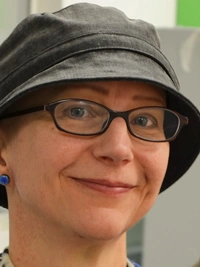 I joined the Sir William Dunn School of Pathology as a Wellcome Trust Career Re-Entry Fellow in 2007, engaged in a program of research into the differentiation of human Pluripotent Stem Cell-derived macrophages for disease modelling. Induced Pluripotent Stem cells (iPSC) derived from patients with genetic disease offers a new, hugely exciting opportunity to model human diseases in vitro. iPSC are particularly important for modelling neurological conditions, where patient material is generally unavailable until after death. To harness this potential, I Head the James and Lillian Martin Centre for Stem Cell Research, with particular interests in the use of iPSC for modelling disease, and expertise in human iPSC derivation, genetic modification, and differentiation to myeloid and neuronal lineages. With the mounting evidence for a role of microglia in the progression of neurodegenerative diseases, I have focussed my research on using our iPSC models to better understand microglial physiology and pathophysiology.
I joined the Sir William Dunn School of Pathology as a Wellcome Trust Career Re-Entry Fellow in 2007, engaged in a program of research into the differentiation of human Pluripotent Stem Cell-derived macrophages for disease modelling. Induced Pluripotent Stem cells (iPSC) derived from patients with genetic disease offers a new, hugely exciting opportunity to model human diseases in vitro. iPSC are particularly important for modelling neurological conditions, where patient material is generally unavailable until after death. To harness this potential, I Head the James and Lillian Martin Centre for Stem Cell Research, with particular interests in the use of iPSC for modelling disease, and expertise in human iPSC derivation, genetic modification, and differentiation to myeloid and neuronal lineages. With the mounting evidence for a role of microglia in the progression of neurodegenerative diseases, I have focussed my research on using our iPSC models to better understand microglial physiology and pathophysiology.
 I joined the Sir William Dunn School of Pathology as a Wellcome Trust Career Re-Entry Fellow in 2007, engaged in a program of research into the differentiation of human Pluripotent Stem Cell-derived macrophages for disease modelling. Induced Pluripotent Stem cells (iPSC) derived from patients with genetic disease offers a new, hugely exciting opportunity to model human diseases in vitro. iPSC are particularly important for modelling neurological conditions, where patient material is generally unavailable until after death. To harness this potential, I Head the James and Lillian Martin Centre for Stem Cell Research, with particular interests in the use of iPSC for modelling disease, and expertise in human iPSC derivation, genetic modification, and differentiation to myeloid and neuronal lineages. With the mounting evidence for a role of microglia in the progression of neurodegenerative diseases, I have focussed my research on using our iPSC models to better understand microglial physiology and pathophysiology.
I joined the Sir William Dunn School of Pathology as a Wellcome Trust Career Re-Entry Fellow in 2007, engaged in a program of research into the differentiation of human Pluripotent Stem Cell-derived macrophages for disease modelling. Induced Pluripotent Stem cells (iPSC) derived from patients with genetic disease offers a new, hugely exciting opportunity to model human diseases in vitro. iPSC are particularly important for modelling neurological conditions, where patient material is generally unavailable until after death. To harness this potential, I Head the James and Lillian Martin Centre for Stem Cell Research, with particular interests in the use of iPSC for modelling disease, and expertise in human iPSC derivation, genetic modification, and differentiation to myeloid and neuronal lineages. With the mounting evidence for a role of microglia in the progression of neurodegenerative diseases, I have focussed my research on using our iPSC models to better understand microglial physiology and pathophysiology.
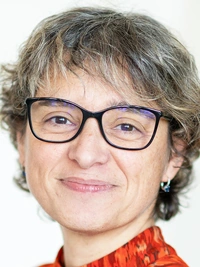 Sandrine Da Cruz is Group Leader, head of the Laboratory of Neurophysiology in Neurodegenerative Disorders at the VIB-KU Leuven Center for Brain and Disease Research and Professor at KU Leuven, Department of Neurosciences of KU Leuven in Belgium since January 2020.
Her research focuses on disease mechanisms and therapy development for Amyotrophic lateral sclerosis (ALS) and frontotemporal dementia (FTD) using mouse models as well as in vitro cellular models including patient-induced pluripotent stem cells. Her lab investigates two main questions: (1) how de-mixing/aggregation of RNA binding proteins TDP-43 and FUS causes toxicity, (2) what causes the early demise of neuromuscular junctions (NMJs) in ALS by studying the role of local axonal translation in the maintenance and loss of axons and NMJs using a combination of spatial omics and imaging approaches, and by screening for therapeutics that improve muscle innervation using a miniaturized motor neuron/muscle co-culture platform.
Sandrine Da Cruz is Group Leader, head of the Laboratory of Neurophysiology in Neurodegenerative Disorders at the VIB-KU Leuven Center for Brain and Disease Research and Professor at KU Leuven, Department of Neurosciences of KU Leuven in Belgium since January 2020.
Her research focuses on disease mechanisms and therapy development for Amyotrophic lateral sclerosis (ALS) and frontotemporal dementia (FTD) using mouse models as well as in vitro cellular models including patient-induced pluripotent stem cells. Her lab investigates two main questions: (1) how de-mixing/aggregation of RNA binding proteins TDP-43 and FUS causes toxicity, (2) what causes the early demise of neuromuscular junctions (NMJs) in ALS by studying the role of local axonal translation in the maintenance and loss of axons and NMJs using a combination of spatial omics and imaging approaches, and by screening for therapeutics that improve muscle innervation using a miniaturized motor neuron/muscle co-culture platform.
Sandrine graduated with distinction in Biochemistry from the University of Grenoble in France. She obtained her PhD in 2005 on mitochondrial biology at the University of Geneva and then for her postdoctoral work, joined the laboratory of Don Cleveland at the University of California San Diego where she started investigating mechanisms of inherited ALS using mouse genetics. In 2013 she transitioned as research scientist at the Ludwig Institute from Cancer Research San Diego Branch, and in 2016 she was appointed Assistant Investigator and head of the Laboratory of Neurobiology. She was recipient of the Milton Safenowitz fellowship from the ALS Association, the Packard Center as well as the Frick Foundation for ALS research, and more recently received the 2023 Drs Ayeez and Shelena Lalji & Family Award for Innovative Healing – for the development of a therapy targeting FUS using antisense oligonucleotides, currently in clinical trial to treat an inherited form of ALS.
 Sandrine Da Cruz is Group Leader, head of the Laboratory of Neurophysiology in Neurodegenerative Disorders at the VIB-KU Leuven Center for Brain and Disease Research and Professor at KU Leuven, Department of Neurosciences of KU Leuven in Belgium since January 2020.
Her research focuses on disease mechanisms and therapy development for Amyotrophic lateral sclerosis (ALS) and frontotemporal dementia (FTD) using mouse models as well as in vitro cellular models including patient-induced pluripotent stem cells. Her lab investigates two main questions: (1) how de-mixing/aggregation of RNA binding proteins TDP-43 and FUS causes toxicity, (2) what causes the early demise of neuromuscular junctions (NMJs) in ALS by studying the role of local axonal translation in the maintenance and loss of axons and NMJs using a combination of spatial omics and imaging approaches, and by screening for therapeutics that improve muscle innervation using a miniaturized motor neuron/muscle co-culture platform.
Sandrine Da Cruz is Group Leader, head of the Laboratory of Neurophysiology in Neurodegenerative Disorders at the VIB-KU Leuven Center for Brain and Disease Research and Professor at KU Leuven, Department of Neurosciences of KU Leuven in Belgium since January 2020.
Her research focuses on disease mechanisms and therapy development for Amyotrophic lateral sclerosis (ALS) and frontotemporal dementia (FTD) using mouse models as well as in vitro cellular models including patient-induced pluripotent stem cells. Her lab investigates two main questions: (1) how de-mixing/aggregation of RNA binding proteins TDP-43 and FUS causes toxicity, (2) what causes the early demise of neuromuscular junctions (NMJs) in ALS by studying the role of local axonal translation in the maintenance and loss of axons and NMJs using a combination of spatial omics and imaging approaches, and by screening for therapeutics that improve muscle innervation using a miniaturized motor neuron/muscle co-culture platform.
Sandrine graduated with distinction in Biochemistry from the University of Grenoble in France. She obtained her PhD in 2005 on mitochondrial biology at the University of Geneva and then for her postdoctoral work, joined the laboratory of Don Cleveland at the University of California San Diego where she started investigating mechanisms of inherited ALS using mouse genetics. In 2013 she transitioned as research scientist at the Ludwig Institute from Cancer Research San Diego Branch, and in 2016 she was appointed Assistant Investigator and head of the Laboratory of Neurobiology. She was recipient of the Milton Safenowitz fellowship from the ALS Association, the Packard Center as well as the Frick Foundation for ALS research, and more recently received the 2023 Drs Ayeez and Shelena Lalji & Family Award for Innovative Healing – for the development of a therapy targeting FUS using antisense oligonucleotides, currently in clinical trial to treat an inherited form of ALS.
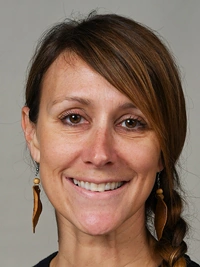 Dr. Eckel-Mahan is currently an Associate Professor at the Brown Foundation Institute of Molecular Medicine at the University of Texas Health Science Center in Houston. She serves as the Director of the MD Anderson/UTHealth Graduate School of Biomedical Sciences Molecular (GSBS) and Translational Biology (MTB) Program, and as Co-Director of the Houston Nutrition and Obesity Research Center. Dr. Eckel-Mahan received her PhD from the University of Washington, Seattle, where she studied mechanisms underlying the circadian activation of the mitogen-activated protein kinase (MAPK) pathway in hippocampal memory consolidation. Following her PhD, Kristin continued her scientific training at the University of California, Irvine, where she studied circadian metabolism in the liver and the impacts of overnutrition in circadian clock reprogramming. In 2015, she joined the Institute of Molecular Medicine as an Assistant Professor in the Center for Metabolic and Degenerative Diseases. Her laboratory remains focused on the many roles of the circadian clock system in metabolism and organism-wide energy balance and disease prevention.
Dr. Eckel-Mahan is currently an Associate Professor at the Brown Foundation Institute of Molecular Medicine at the University of Texas Health Science Center in Houston. She serves as the Director of the MD Anderson/UTHealth Graduate School of Biomedical Sciences Molecular (GSBS) and Translational Biology (MTB) Program, and as Co-Director of the Houston Nutrition and Obesity Research Center. Dr. Eckel-Mahan received her PhD from the University of Washington, Seattle, where she studied mechanisms underlying the circadian activation of the mitogen-activated protein kinase (MAPK) pathway in hippocampal memory consolidation. Following her PhD, Kristin continued her scientific training at the University of California, Irvine, where she studied circadian metabolism in the liver and the impacts of overnutrition in circadian clock reprogramming. In 2015, she joined the Institute of Molecular Medicine as an Assistant Professor in the Center for Metabolic and Degenerative Diseases. Her laboratory remains focused on the many roles of the circadian clock system in metabolism and organism-wide energy balance and disease prevention.
 Dr. Eckel-Mahan is currently an Associate Professor at the Brown Foundation Institute of Molecular Medicine at the University of Texas Health Science Center in Houston. She serves as the Director of the MD Anderson/UTHealth Graduate School of Biomedical Sciences Molecular (GSBS) and Translational Biology (MTB) Program, and as Co-Director of the Houston Nutrition and Obesity Research Center. Dr. Eckel-Mahan received her PhD from the University of Washington, Seattle, where she studied mechanisms underlying the circadian activation of the mitogen-activated protein kinase (MAPK) pathway in hippocampal memory consolidation. Following her PhD, Kristin continued her scientific training at the University of California, Irvine, where she studied circadian metabolism in the liver and the impacts of overnutrition in circadian clock reprogramming. In 2015, she joined the Institute of Molecular Medicine as an Assistant Professor in the Center for Metabolic and Degenerative Diseases. Her laboratory remains focused on the many roles of the circadian clock system in metabolism and organism-wide energy balance and disease prevention.
Dr. Eckel-Mahan is currently an Associate Professor at the Brown Foundation Institute of Molecular Medicine at the University of Texas Health Science Center in Houston. She serves as the Director of the MD Anderson/UTHealth Graduate School of Biomedical Sciences Molecular (GSBS) and Translational Biology (MTB) Program, and as Co-Director of the Houston Nutrition and Obesity Research Center. Dr. Eckel-Mahan received her PhD from the University of Washington, Seattle, where she studied mechanisms underlying the circadian activation of the mitogen-activated protein kinase (MAPK) pathway in hippocampal memory consolidation. Following her PhD, Kristin continued her scientific training at the University of California, Irvine, where she studied circadian metabolism in the liver and the impacts of overnutrition in circadian clock reprogramming. In 2015, she joined the Institute of Molecular Medicine as an Assistant Professor in the Center for Metabolic and Degenerative Diseases. Her laboratory remains focused on the many roles of the circadian clock system in metabolism and organism-wide energy balance and disease prevention.
 Matthew completed his undergraduate degree in Biochemistry at King’s College London before undertaking an MRes in Cancer Biology at Imperial College London, where he was awarded the Faculty of Medicine Dean’s Prize in Cancer Biology for his research with Dr Andrew Porter on chronic myeloid leukaemia and Dr Nic Tapon on the Hippo pathway in tumour development. Following this, Matthew worked as a Research Assistant in Professor Stefan Marciniak’s laboratory at the University of Cambridge under the guidance of Dr Jennifer Dickens investigating the trafficking of surfactant protein C.
Matthew completed his undergraduate degree in Biochemistry at King’s College London before undertaking an MRes in Cancer Biology at Imperial College London, where he was awarded the Faculty of Medicine Dean’s Prize in Cancer Biology for his research with Dr Andrew Porter on chronic myeloid leukaemia and Dr Nic Tapon on the Hippo pathway in tumour development. Following this, Matthew worked as a Research Assistant in Professor Stefan Marciniak’s laboratory at the University of Cambridge under the guidance of Dr Jennifer Dickens investigating the trafficking of surfactant protein C.
Matthew was awarded an MRC studentship and an Exeter College scholarship to undertake his DPhil in Oncology at the University of Oxford, where he investigated the role of IGF-1R in prostate cancer radio-sensitivity under the supervision of Professor Valentine Macaulay, becoming interested in DNA repair mechanisms.
While studying graduate medicine at University College London he was awarded the Sekforde House Trust Scholarship and the Stapley Trust Award. During his training he worked in the lab of Professor Wojciech Niedzwiedz at the Institute of Cancer Research, studying the mechanisms behind genomic instability, ultimately deciding to pursue academic research full-time.
As a Research Associate in the Balmus lab and at Trinity Hall, he focuses on developing therapies that exploit defective DNA repair in neurodegenerative conditions such as in ataxia telangiectasia and Huntington’s Disease.
 Matthew completed his undergraduate degree in Biochemistry at King’s College London before undertaking an MRes in Cancer Biology at Imperial College London, where he was awarded the Faculty of Medicine Dean’s Prize in Cancer Biology for his research with Dr Andrew Porter on chronic myeloid leukaemia and Dr Nic Tapon on the Hippo pathway in tumour development. Following this, Matthew worked as a Research Assistant in Professor Stefan Marciniak’s laboratory at the University of Cambridge under the guidance of Dr Jennifer Dickens investigating the trafficking of surfactant protein C.
Matthew completed his undergraduate degree in Biochemistry at King’s College London before undertaking an MRes in Cancer Biology at Imperial College London, where he was awarded the Faculty of Medicine Dean’s Prize in Cancer Biology for his research with Dr Andrew Porter on chronic myeloid leukaemia and Dr Nic Tapon on the Hippo pathway in tumour development. Following this, Matthew worked as a Research Assistant in Professor Stefan Marciniak’s laboratory at the University of Cambridge under the guidance of Dr Jennifer Dickens investigating the trafficking of surfactant protein C.
Matthew was awarded an MRC studentship and an Exeter College scholarship to undertake his DPhil in Oncology at the University of Oxford, where he investigated the role of IGF-1R in prostate cancer radio-sensitivity under the supervision of Professor Valentine Macaulay, becoming interested in DNA repair mechanisms.
While studying graduate medicine at University College London he was awarded the Sekforde House Trust Scholarship and the Stapley Trust Award. During his training he worked in the lab of Professor Wojciech Niedzwiedz at the Institute of Cancer Research, studying the mechanisms behind genomic instability, ultimately deciding to pursue academic research full-time.
As a Research Associate in the Balmus lab and at Trinity Hall, he focuses on developing therapies that exploit defective DNA repair in neurodegenerative conditions such as in ataxia telangiectasia and Huntington’s Disease.
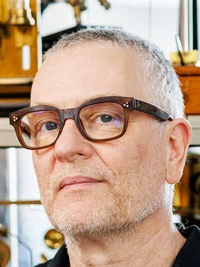 Paul Frankland is a Senior Scientist in the program in Neurosciences & Mental Health at the Hospital for Sick Children, and a fellow of the Royal Society of Canada and the Canadian Academy of Health Sciences. He holds a Canada Research Chair in Cognitive Neurobiology, and is appointed as a Full Professor in the Department of Psychology, Department of Physiology and Institute of Medical Science at the University of Toronto. He is also a member of the Canadian Institute for Advanced Research (CIFAR) in the program for Child and Brain Development. His research program combines behavior, imaging and molecular approaches to study the neurobiology of memory. Using contemporary tools, Frankland has tackled classical questions in the memory field: Why do we lose our earliest childhood memories? Are memories are broadly distributed or localized in the brain? How does the brain forget? Is it possible to implant memories?
Paul Frankland is a Senior Scientist in the program in Neurosciences & Mental Health at the Hospital for Sick Children, and a fellow of the Royal Society of Canada and the Canadian Academy of Health Sciences. He holds a Canada Research Chair in Cognitive Neurobiology, and is appointed as a Full Professor in the Department of Psychology, Department of Physiology and Institute of Medical Science at the University of Toronto. He is also a member of the Canadian Institute for Advanced Research (CIFAR) in the program for Child and Brain Development. His research program combines behavior, imaging and molecular approaches to study the neurobiology of memory. Using contemporary tools, Frankland has tackled classical questions in the memory field: Why do we lose our earliest childhood memories? Are memories are broadly distributed or localized in the brain? How does the brain forget? Is it possible to implant memories?
 Paul Frankland is a Senior Scientist in the program in Neurosciences & Mental Health at the Hospital for Sick Children, and a fellow of the Royal Society of Canada and the Canadian Academy of Health Sciences. He holds a Canada Research Chair in Cognitive Neurobiology, and is appointed as a Full Professor in the Department of Psychology, Department of Physiology and Institute of Medical Science at the University of Toronto. He is also a member of the Canadian Institute for Advanced Research (CIFAR) in the program for Child and Brain Development. His research program combines behavior, imaging and molecular approaches to study the neurobiology of memory. Using contemporary tools, Frankland has tackled classical questions in the memory field: Why do we lose our earliest childhood memories? Are memories are broadly distributed or localized in the brain? How does the brain forget? Is it possible to implant memories?
Paul Frankland is a Senior Scientist in the program in Neurosciences & Mental Health at the Hospital for Sick Children, and a fellow of the Royal Society of Canada and the Canadian Academy of Health Sciences. He holds a Canada Research Chair in Cognitive Neurobiology, and is appointed as a Full Professor in the Department of Psychology, Department of Physiology and Institute of Medical Science at the University of Toronto. He is also a member of the Canadian Institute for Advanced Research (CIFAR) in the program for Child and Brain Development. His research program combines behavior, imaging and molecular approaches to study the neurobiology of memory. Using contemporary tools, Frankland has tackled classical questions in the memory field: Why do we lose our earliest childhood memories? Are memories are broadly distributed or localized in the brain? How does the brain forget? Is it possible to implant memories?
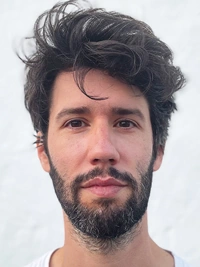 Dr Juan Gallego is a Senior Lecturer in the Department of Bioengineering at Imperial College London, which he joined in January 2020. Prior to that, he held Postdoctoral Fellowships at the Spanish National Research Council (CSIC) and Northwestern University. He was awarded a PhD from CSIC and University Carlos III in 2013.
Dr Juan Gallego is a Senior Lecturer in the Department of Bioengineering at Imperial College London, which he joined in January 2020. Prior to that, he held Postdoctoral Fellowships at the Spanish National Research Council (CSIC) and Northwestern University. He was awarded a PhD from CSIC and University Carlos III in 2013.
His research focuses on understanding how animals learn and control their movements through a combination of behavioural experiments, large-scale neural recordings, data analysis, and computational models. He is also interested in applying his group’s findings to advance neural interfaces to restore function to people with movement disorders. During his career, he has published thirty journal articles on these various topics. His research has been funded by the EU Commission, the UK Research Institutes, and the ERC. Dr Gallego is an elected board member of the Society for the Neural Control of Movement and is part of the program committee for COSYNE.
 Dr Juan Gallego is a Senior Lecturer in the Department of Bioengineering at Imperial College London, which he joined in January 2020. Prior to that, he held Postdoctoral Fellowships at the Spanish National Research Council (CSIC) and Northwestern University. He was awarded a PhD from CSIC and University Carlos III in 2013.
Dr Juan Gallego is a Senior Lecturer in the Department of Bioengineering at Imperial College London, which he joined in January 2020. Prior to that, he held Postdoctoral Fellowships at the Spanish National Research Council (CSIC) and Northwestern University. He was awarded a PhD from CSIC and University Carlos III in 2013.
His research focuses on understanding how animals learn and control their movements through a combination of behavioural experiments, large-scale neural recordings, data analysis, and computational models. He is also interested in applying his group’s findings to advance neural interfaces to restore function to people with movement disorders. During his career, he has published thirty journal articles on these various topics. His research has been funded by the EU Commission, the UK Research Institutes, and the ERC. Dr Gallego is an elected board member of the Society for the Neural Control of Movement and is part of the program committee for COSYNE.
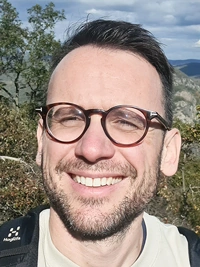 I graduated in medicine in 2002 at Universitat Autònoma de Barcelona and obtained a PhD in Neuroscience at the same university in 2006. During my PhD, I performed experiments in the field of Behavioral and Molecular Pharmacology using animal models of vulnerability to addiction. After obtaining a PhD, my interests expanded to Cognitive Neuroscience and between 2008 and 2012 I was a postdoctoral fellow first at the Institute of Cognitive Neuroscience and thereafter at the Wellcome Trust Centre for Neuroimaging, at University College London (UCL). Since 2013, I am based a at the Aging Research Center, Karolinska Institute, Sweden where I am a principal researcher and associate professor. In 2020, I completed my residency in psychiatry in Sweden and I currently work parttime as a consultant psychiatrist at the Affective disorder unit at Psykiatri Nordväst, Stockholm, Sweden.
I graduated in medicine in 2002 at Universitat Autònoma de Barcelona and obtained a PhD in Neuroscience at the same university in 2006. During my PhD, I performed experiments in the field of Behavioral and Molecular Pharmacology using animal models of vulnerability to addiction. After obtaining a PhD, my interests expanded to Cognitive Neuroscience and between 2008 and 2012 I was a postdoctoral fellow first at the Institute of Cognitive Neuroscience and thereafter at the Wellcome Trust Centre for Neuroimaging, at University College London (UCL). Since 2013, I am based a at the Aging Research Center, Karolinska Institute, Sweden where I am a principal researcher and associate professor. In 2020, I completed my residency in psychiatry in Sweden and I currently work parttime as a consultant psychiatrist at the Affective disorder unit at Psykiatri Nordväst, Stockholm, Sweden.
 I graduated in medicine in 2002 at Universitat Autònoma de Barcelona and obtained a PhD in Neuroscience at the same university in 2006. During my PhD, I performed experiments in the field of Behavioral and Molecular Pharmacology using animal models of vulnerability to addiction. After obtaining a PhD, my interests expanded to Cognitive Neuroscience and between 2008 and 2012 I was a postdoctoral fellow first at the Institute of Cognitive Neuroscience and thereafter at the Wellcome Trust Centre for Neuroimaging, at University College London (UCL). Since 2013, I am based a at the Aging Research Center, Karolinska Institute, Sweden where I am a principal researcher and associate professor. In 2020, I completed my residency in psychiatry in Sweden and I currently work parttime as a consultant psychiatrist at the Affective disorder unit at Psykiatri Nordväst, Stockholm, Sweden.
I graduated in medicine in 2002 at Universitat Autònoma de Barcelona and obtained a PhD in Neuroscience at the same university in 2006. During my PhD, I performed experiments in the field of Behavioral and Molecular Pharmacology using animal models of vulnerability to addiction. After obtaining a PhD, my interests expanded to Cognitive Neuroscience and between 2008 and 2012 I was a postdoctoral fellow first at the Institute of Cognitive Neuroscience and thereafter at the Wellcome Trust Centre for Neuroimaging, at University College London (UCL). Since 2013, I am based a at the Aging Research Center, Karolinska Institute, Sweden where I am a principal researcher and associate professor. In 2020, I completed my residency in psychiatry in Sweden and I currently work parttime as a consultant psychiatrist at the Affective disorder unit at Psykiatri Nordväst, Stockholm, Sweden.
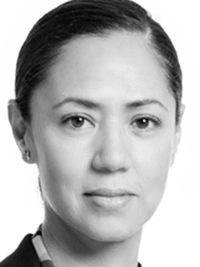 Dr. Carolina Gutierrez Herrera is a Group Leader at the Center for Experimental Neurology (ZEN) at
the University of Bern. With a strong background in neuroscience and training in the USA and
Canada, she established an independent research career in Switzerland. She leads a translational
research program in the Department of Neurology focused on the neurobiological mechanisms of
sleep and its connection to mental health.
Dr. Carolina Gutierrez Herrera is a Group Leader at the Center for Experimental Neurology (ZEN) at
the University of Bern. With a strong background in neuroscience and training in the USA and
Canada, she established an independent research career in Switzerland. She leads a translational
research program in the Department of Neurology focused on the neurobiological mechanisms of
sleep and its connection to mental health.
Her work investigates how cellular and circuit-level disruptions in neuron-astrocyte networks
contribute to sleep alterations in neuropsychiatric disorders. Using advanced technologies and
computational tools, her team explores neural circuits involved in sleep stability, the role of sleep in
cognitive function, and the potential of sleep-based interventions in neuropsychiatric and
neurological conditions.
She has uncovered key findings, including how oxidative stress impacts specific neuronal and
astrocytic networks, contributing to sleep fragmentation in schizophrenia. Her team has also
developed pharmacological strategies to restore sleep homeostasis and is pioneering non-invasive
therapeutic approaches, such as slow-wave modulation, to support cognitive recovery—particularly
following stroke.
Beyond her research, Dr. Gutierrez Herrera is deeply committed to mentoring and to building
international training networks that foster interdisciplinary learning, cultural exchange, and skill
development across neuroscience, medicine, and computational science. She values collaboration,
and through it, continues to shape the future of neuroscience with impactful research, strong
leadership, and a commitment to innovation.
 Dr. Carolina Gutierrez Herrera is a Group Leader at the Center for Experimental Neurology (ZEN) at
the University of Bern. With a strong background in neuroscience and training in the USA and
Canada, she established an independent research career in Switzerland. She leads a translational
research program in the Department of Neurology focused on the neurobiological mechanisms of
sleep and its connection to mental health.
Dr. Carolina Gutierrez Herrera is a Group Leader at the Center for Experimental Neurology (ZEN) at
the University of Bern. With a strong background in neuroscience and training in the USA and
Canada, she established an independent research career in Switzerland. She leads a translational
research program in the Department of Neurology focused on the neurobiological mechanisms of
sleep and its connection to mental health.
Her work investigates how cellular and circuit-level disruptions in neuron-astrocyte networks
contribute to sleep alterations in neuropsychiatric disorders. Using advanced technologies and
computational tools, her team explores neural circuits involved in sleep stability, the role of sleep in
cognitive function, and the potential of sleep-based interventions in neuropsychiatric and
neurological conditions.
She has uncovered key findings, including how oxidative stress impacts specific neuronal and
astrocytic networks, contributing to sleep fragmentation in schizophrenia. Her team has also
developed pharmacological strategies to restore sleep homeostasis and is pioneering non-invasive
therapeutic approaches, such as slow-wave modulation, to support cognitive recovery—particularly
following stroke.
Beyond her research, Dr. Gutierrez Herrera is deeply committed to mentoring and to building
international training networks that foster interdisciplinary learning, cultural exchange, and skill
development across neuroscience, medicine, and computational science. She values collaboration,
and through it, continues to shape the future of neuroscience with impactful research, strong
leadership, and a commitment to innovation.
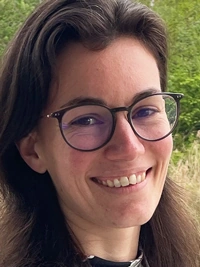 As Policy & Projects Officer at the European Animal Research Association and Co-ordinator of the Transparency Agreement on Animal Research for Stichting Informatie Dierproeven, I work to bridge the gap between scientific research, policy-making, and the public by promoting transparency openness in animal research.
As Policy & Projects Officer at the European Animal Research Association and Co-ordinator of the Transparency Agreement on Animal Research for Stichting Informatie Dierproeven, I work to bridge the gap between scientific research, policy-making, and the public by promoting transparency openness in animal research.
How important this is first became clear to me during my Bachelor's and Master's studies. While the Dutch research community upholds high standards of scientific quality and animal welfare, research institutes have traditionally been hesitant to communicate openly about their use of animals. Meanwhile, animal welfare and activist organizations could set the tone in the debate.
I earned my PhD in Biology from the University Medical Center in Freiburg where I studied neuroinflammatory and neurodegenerative processes using both in vivo and in vitro methods. During my doctoral research, I began working for the European Animal Research Association and I assisted the shaping of the Dutch Transparency Agreement on Animal Research. In my current role, I support the research community by facilitating connections, sharing best practices, and creating opportunities to better integrate scientific research into political discussions.
 As Policy & Projects Officer at the European Animal Research Association and Co-ordinator of the Transparency Agreement on Animal Research for Stichting Informatie Dierproeven, I work to bridge the gap between scientific research, policy-making, and the public by promoting transparency openness in animal research.
As Policy & Projects Officer at the European Animal Research Association and Co-ordinator of the Transparency Agreement on Animal Research for Stichting Informatie Dierproeven, I work to bridge the gap between scientific research, policy-making, and the public by promoting transparency openness in animal research.
How important this is first became clear to me during my Bachelor's and Master's studies. While the Dutch research community upholds high standards of scientific quality and animal welfare, research institutes have traditionally been hesitant to communicate openly about their use of animals. Meanwhile, animal welfare and activist organizations could set the tone in the debate.
I earned my PhD in Biology from the University Medical Center in Freiburg where I studied neuroinflammatory and neurodegenerative processes using both in vivo and in vitro methods. During my doctoral research, I began working for the European Animal Research Association and I assisted the shaping of the Dutch Transparency Agreement on Animal Research. In my current role, I support the research community by facilitating connections, sharing best practices, and creating opportunities to better integrate scientific research into political discussions.
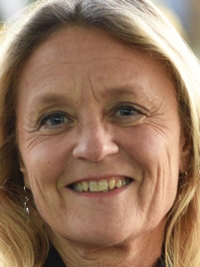 Helena Karlström is Associated professor, Senior Lecturer in Neurogeriatrics and Head of Division of Neurogeriatrics, at Department of Neurobiology, Care Sciences and Society, Karolinska Institutet.
Helena Karlström is Associated professor, Senior Lecturer in Neurogeriatrics and Head of Division of Neurogeriatrics, at Department of Neurobiology, Care Sciences and Society, Karolinska Institutet.
Helena Karlström has made important contributions in understanding the mechanisms in Notch3 biology, more specifically in relation to the familial small vessel disease Cerebral Autosomal-Dominant Arteriopathy with Subcortical Infarcts and Leukoencephalopathy (CADASIL). Her lab aims to better understand the molecular mechanisms of this condition in order to develop therapeutics to tackle CADASIL. The hypothesis is that if the immune system can be harnessed to clear the Notch3 deposits, CADASIL can potentially be halted and the progression be reversed.
The lab has recently developed an active immunotherapy project with encouraging results and ongoing studies aim to develop biomarkers to study disease progression and monoclonal antibodies that target Notch3 aggregates and thus be used as a passive immunization therapy.
Moreover, her research group is also focusing on understanding the connection of impaired vasculature and cognitive decline with the involvement of glial cells.
 Helena Karlström is Associated professor, Senior Lecturer in Neurogeriatrics and Head of Division of Neurogeriatrics, at Department of Neurobiology, Care Sciences and Society, Karolinska Institutet.
Helena Karlström is Associated professor, Senior Lecturer in Neurogeriatrics and Head of Division of Neurogeriatrics, at Department of Neurobiology, Care Sciences and Society, Karolinska Institutet.
Helena Karlström has made important contributions in understanding the mechanisms in Notch3 biology, more specifically in relation to the familial small vessel disease Cerebral Autosomal-Dominant Arteriopathy with Subcortical Infarcts and Leukoencephalopathy (CADASIL). Her lab aims to better understand the molecular mechanisms of this condition in order to develop therapeutics to tackle CADASIL. The hypothesis is that if the immune system can be harnessed to clear the Notch3 deposits, CADASIL can potentially be halted and the progression be reversed.
The lab has recently developed an active immunotherapy project with encouraging results and ongoing studies aim to develop biomarkers to study disease progression and monoclonal antibodies that target Notch3 aggregates and thus be used as a passive immunization therapy.
Moreover, her research group is also focusing on understanding the connection of impaired vasculature and cognitive decline with the involvement of glial cells.
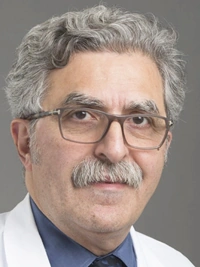 Ali Keshavarzian MD, FRCP, FACP, AGAF, MACG is a clinician scientist and practicing gastroenterologist for the last 4 decades with expertise in management of GI complications of Parkinson disease (PD). He is Josephine M. Dyrenforth chair of Gastroenterology, Professor of Medicine, Physiology, Anatomy & Cell biology and Director of Rush Center for Integrated Microbiome and Chronobiology Research. He received his MD from Tehran University Medical school in Iran. Following his residency and GI fellowship training in England in 1984, he held faculty positions at University of Maryland, Loyola University Medical Center and Rush University Medical Center in Chicago where was also chief of GI till 2022. He has been studying the impact of environmental factors on intestinal barrier function, intestinal inflammation, and microbe–host interactions since 1986 and, importantly, the role of microbiota-brain-axis in Parkinson disease (PD) for the last 15 years. His group has pioneered the area of the microbiota-gut-brain axis role in PD pathogenesis by studying both PD patients and animal models of PD: (1) first to show gut leakiness in newly diagnosed PD patients and that leakiness correlates with α-synuclein staining in the colon and bacterial translocation, (2) one of the first to report gut and oro-nasal microbiota dysbiosis in PD patients and (3) one of the first groups to look for causal link between dysbiosis and PD pathogenesis through FMT and TLR4KO animal models and use of microbiota-directed intervention (prebiotics) in patients with PD. He has contributed to several book chapters and over 431 peer-reviewed published articles with an h-index of 106.
Ali Keshavarzian MD, FRCP, FACP, AGAF, MACG is a clinician scientist and practicing gastroenterologist for the last 4 decades with expertise in management of GI complications of Parkinson disease (PD). He is Josephine M. Dyrenforth chair of Gastroenterology, Professor of Medicine, Physiology, Anatomy & Cell biology and Director of Rush Center for Integrated Microbiome and Chronobiology Research. He received his MD from Tehran University Medical school in Iran. Following his residency and GI fellowship training in England in 1984, he held faculty positions at University of Maryland, Loyola University Medical Center and Rush University Medical Center in Chicago where was also chief of GI till 2022. He has been studying the impact of environmental factors on intestinal barrier function, intestinal inflammation, and microbe–host interactions since 1986 and, importantly, the role of microbiota-brain-axis in Parkinson disease (PD) for the last 15 years. His group has pioneered the area of the microbiota-gut-brain axis role in PD pathogenesis by studying both PD patients and animal models of PD: (1) first to show gut leakiness in newly diagnosed PD patients and that leakiness correlates with α-synuclein staining in the colon and bacterial translocation, (2) one of the first to report gut and oro-nasal microbiota dysbiosis in PD patients and (3) one of the first groups to look for causal link between dysbiosis and PD pathogenesis through FMT and TLR4KO animal models and use of microbiota-directed intervention (prebiotics) in patients with PD. He has contributed to several book chapters and over 431 peer-reviewed published articles with an h-index of 106.
 Ali Keshavarzian MD, FRCP, FACP, AGAF, MACG is a clinician scientist and practicing gastroenterologist for the last 4 decades with expertise in management of GI complications of Parkinson disease (PD). He is Josephine M. Dyrenforth chair of Gastroenterology, Professor of Medicine, Physiology, Anatomy & Cell biology and Director of Rush Center for Integrated Microbiome and Chronobiology Research. He received his MD from Tehran University Medical school in Iran. Following his residency and GI fellowship training in England in 1984, he held faculty positions at University of Maryland, Loyola University Medical Center and Rush University Medical Center in Chicago where was also chief of GI till 2022. He has been studying the impact of environmental factors on intestinal barrier function, intestinal inflammation, and microbe–host interactions since 1986 and, importantly, the role of microbiota-brain-axis in Parkinson disease (PD) for the last 15 years. His group has pioneered the area of the microbiota-gut-brain axis role in PD pathogenesis by studying both PD patients and animal models of PD: (1) first to show gut leakiness in newly diagnosed PD patients and that leakiness correlates with α-synuclein staining in the colon and bacterial translocation, (2) one of the first to report gut and oro-nasal microbiota dysbiosis in PD patients and (3) one of the first groups to look for causal link between dysbiosis and PD pathogenesis through FMT and TLR4KO animal models and use of microbiota-directed intervention (prebiotics) in patients with PD. He has contributed to several book chapters and over 431 peer-reviewed published articles with an h-index of 106.
Ali Keshavarzian MD, FRCP, FACP, AGAF, MACG is a clinician scientist and practicing gastroenterologist for the last 4 decades with expertise in management of GI complications of Parkinson disease (PD). He is Josephine M. Dyrenforth chair of Gastroenterology, Professor of Medicine, Physiology, Anatomy & Cell biology and Director of Rush Center for Integrated Microbiome and Chronobiology Research. He received his MD from Tehran University Medical school in Iran. Following his residency and GI fellowship training in England in 1984, he held faculty positions at University of Maryland, Loyola University Medical Center and Rush University Medical Center in Chicago where was also chief of GI till 2022. He has been studying the impact of environmental factors on intestinal barrier function, intestinal inflammation, and microbe–host interactions since 1986 and, importantly, the role of microbiota-brain-axis in Parkinson disease (PD) for the last 15 years. His group has pioneered the area of the microbiota-gut-brain axis role in PD pathogenesis by studying both PD patients and animal models of PD: (1) first to show gut leakiness in newly diagnosed PD patients and that leakiness correlates with α-synuclein staining in the colon and bacterial translocation, (2) one of the first to report gut and oro-nasal microbiota dysbiosis in PD patients and (3) one of the first groups to look for causal link between dysbiosis and PD pathogenesis through FMT and TLR4KO animal models and use of microbiota-directed intervention (prebiotics) in patients with PD. He has contributed to several book chapters and over 431 peer-reviewed published articles with an h-index of 106.
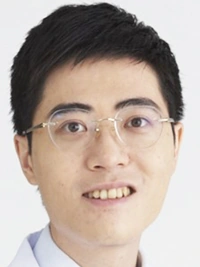 Hei Ming Lai is a clinician-scientist working on bringing 3D histology to clinical diagnostics applications. He obtained his Bachelor of Medicine and Bachelor of Surgery in 2018, is a registered medical practitioner in 2019, and started his own group in 2020 in the Chinese University of Hong Kong. Since 2015 he has been developing pragmatic 3D histology technologies for research and clinical use, with a focus on simplicity and scalability to ensure 3D tissue analysis is widely accessible. He believes biology should be studied in 3D.
Hei Ming Lai is a clinician-scientist working on bringing 3D histology to clinical diagnostics applications. He obtained his Bachelor of Medicine and Bachelor of Surgery in 2018, is a registered medical practitioner in 2019, and started his own group in 2020 in the Chinese University of Hong Kong. Since 2015 he has been developing pragmatic 3D histology technologies for research and clinical use, with a focus on simplicity and scalability to ensure 3D tissue analysis is widely accessible. He believes biology should be studied in 3D.
 Hei Ming Lai is a clinician-scientist working on bringing 3D histology to clinical diagnostics applications. He obtained his Bachelor of Medicine and Bachelor of Surgery in 2018, is a registered medical practitioner in 2019, and started his own group in 2020 in the Chinese University of Hong Kong. Since 2015 he has been developing pragmatic 3D histology technologies for research and clinical use, with a focus on simplicity and scalability to ensure 3D tissue analysis is widely accessible. He believes biology should be studied in 3D.
Hei Ming Lai is a clinician-scientist working on bringing 3D histology to clinical diagnostics applications. He obtained his Bachelor of Medicine and Bachelor of Surgery in 2018, is a registered medical practitioner in 2019, and started his own group in 2020 in the Chinese University of Hong Kong. Since 2015 he has been developing pragmatic 3D histology technologies for research and clinical use, with a focus on simplicity and scalability to ensure 3D tissue analysis is widely accessible. He believes biology should be studied in 3D.
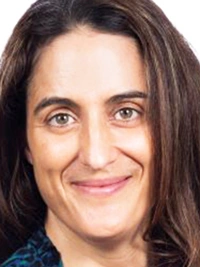 I am a theoretical neuroscientist based at the University of Manchester. My research is focussed on understanding mechanisms of plasticity using a combination of computational modelling, EEG, fMRI, MR spectroscopy. I develop mathematical models to explain the biochemical mechanisms that underpin plasticity so that we can learn how to modulate them. The models are used to make predictions which are, in turn, testable experimentally. Ultimately, it is hoped that modelling work of this kind will optimise non-invasive brain stimulation and aid both clinicians and researchers working in this field.
I am a theoretical neuroscientist based at the University of Manchester. My research is focussed on understanding mechanisms of plasticity using a combination of computational modelling, EEG, fMRI, MR spectroscopy. I develop mathematical models to explain the biochemical mechanisms that underpin plasticity so that we can learn how to modulate them. The models are used to make predictions which are, in turn, testable experimentally. Ultimately, it is hoped that modelling work of this kind will optimise non-invasive brain stimulation and aid both clinicians and researchers working in this field.
 I am a theoretical neuroscientist based at the University of Manchester. My research is focussed on understanding mechanisms of plasticity using a combination of computational modelling, EEG, fMRI, MR spectroscopy. I develop mathematical models to explain the biochemical mechanisms that underpin plasticity so that we can learn how to modulate them. The models are used to make predictions which are, in turn, testable experimentally. Ultimately, it is hoped that modelling work of this kind will optimise non-invasive brain stimulation and aid both clinicians and researchers working in this field.
I am a theoretical neuroscientist based at the University of Manchester. My research is focussed on understanding mechanisms of plasticity using a combination of computational modelling, EEG, fMRI, MR spectroscopy. I develop mathematical models to explain the biochemical mechanisms that underpin plasticity so that we can learn how to modulate them. The models are used to make predictions which are, in turn, testable experimentally. Ultimately, it is hoped that modelling work of this kind will optimise non-invasive brain stimulation and aid both clinicians and researchers working in this field.
 After a PhD of the development of the auditory cortex under the supervision of the Christine Petit (Institut Pasteur, Paris, France), Baptiste Libé-Philippot performed his postdoctoral work in the laboratory of Pierre Vanderhaeghen (VIB KU Leuven, Belgium). His work constitutes the first example of hominid-specific proteins involved in the emergence of developmental and functional characteristics of human neurons, potentially linking human neuronal evolution to neurological disorders. First, he deorphanized and discovered the role of a hominid-specific receptor, LRRC37B, uniquely expressed in human cortical pyramidal neurons where it contributes to species-specific functional properties, including a lower intrinsic excitability. Secondly, he demonstrated the requirement of the human-specific genes SRGAP2B/C in the protracted synaptic development of human cortical neurons and linked those human-specific genes to intellectual disability / autism spectrum disorder molecular pathways. Since 2024, he leads the team "Human Neuronal Evolution" (IBDM, CNRS, Aix-Marseille University, France), on the evolution of human cerebellar neurons and circuits, with the support of an ERC Sarting Grant, the French ATIP-Avenir program and the AMIDEX Foundation.
After a PhD of the development of the auditory cortex under the supervision of the Christine Petit (Institut Pasteur, Paris, France), Baptiste Libé-Philippot performed his postdoctoral work in the laboratory of Pierre Vanderhaeghen (VIB KU Leuven, Belgium). His work constitutes the first example of hominid-specific proteins involved in the emergence of developmental and functional characteristics of human neurons, potentially linking human neuronal evolution to neurological disorders. First, he deorphanized and discovered the role of a hominid-specific receptor, LRRC37B, uniquely expressed in human cortical pyramidal neurons where it contributes to species-specific functional properties, including a lower intrinsic excitability. Secondly, he demonstrated the requirement of the human-specific genes SRGAP2B/C in the protracted synaptic development of human cortical neurons and linked those human-specific genes to intellectual disability / autism spectrum disorder molecular pathways. Since 2024, he leads the team "Human Neuronal Evolution" (IBDM, CNRS, Aix-Marseille University, France), on the evolution of human cerebellar neurons and circuits, with the support of an ERC Sarting Grant, the French ATIP-Avenir program and the AMIDEX Foundation.
 After a PhD of the development of the auditory cortex under the supervision of the Christine Petit (Institut Pasteur, Paris, France), Baptiste Libé-Philippot performed his postdoctoral work in the laboratory of Pierre Vanderhaeghen (VIB KU Leuven, Belgium). His work constitutes the first example of hominid-specific proteins involved in the emergence of developmental and functional characteristics of human neurons, potentially linking human neuronal evolution to neurological disorders. First, he deorphanized and discovered the role of a hominid-specific receptor, LRRC37B, uniquely expressed in human cortical pyramidal neurons where it contributes to species-specific functional properties, including a lower intrinsic excitability. Secondly, he demonstrated the requirement of the human-specific genes SRGAP2B/C in the protracted synaptic development of human cortical neurons and linked those human-specific genes to intellectual disability / autism spectrum disorder molecular pathways. Since 2024, he leads the team "Human Neuronal Evolution" (IBDM, CNRS, Aix-Marseille University, France), on the evolution of human cerebellar neurons and circuits, with the support of an ERC Sarting Grant, the French ATIP-Avenir program and the AMIDEX Foundation.
After a PhD of the development of the auditory cortex under the supervision of the Christine Petit (Institut Pasteur, Paris, France), Baptiste Libé-Philippot performed his postdoctoral work in the laboratory of Pierre Vanderhaeghen (VIB KU Leuven, Belgium). His work constitutes the first example of hominid-specific proteins involved in the emergence of developmental and functional characteristics of human neurons, potentially linking human neuronal evolution to neurological disorders. First, he deorphanized and discovered the role of a hominid-specific receptor, LRRC37B, uniquely expressed in human cortical pyramidal neurons where it contributes to species-specific functional properties, including a lower intrinsic excitability. Secondly, he demonstrated the requirement of the human-specific genes SRGAP2B/C in the protracted synaptic development of human cortical neurons and linked those human-specific genes to intellectual disability / autism spectrum disorder molecular pathways. Since 2024, he leads the team "Human Neuronal Evolution" (IBDM, CNRS, Aix-Marseille University, France), on the evolution of human cerebellar neurons and circuits, with the support of an ERC Sarting Grant, the French ATIP-Avenir program and the AMIDEX Foundation.
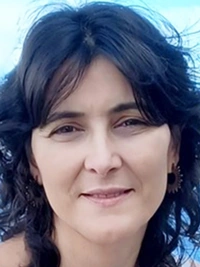 Carla Lopes graduated in Biomedical Engineering from the University of Coimbra and earned her PhD in Experimental Biology and Biomedicine in 2015.
Carla Lopes graduated in Biomedical Engineering from the University of Coimbra and earned her PhD in Experimental Biology and Biomedicine in 2015.
She is currently an Assistant Researcher at the Multidisciplinary Institute of Ageing, University of Coimbra. Her research investigates the mechanisms by which mitochondrial dysfunction and cell-secreted extracellular vesicles drive neuroinflammation, with an emphasis on their role in the progression of neurodegenerative diseases associated with aging.
 Carla Lopes graduated in Biomedical Engineering from the University of Coimbra and earned her PhD in Experimental Biology and Biomedicine in 2015.
Carla Lopes graduated in Biomedical Engineering from the University of Coimbra and earned her PhD in Experimental Biology and Biomedicine in 2015.
She is currently an Assistant Researcher at the Multidisciplinary Institute of Ageing, University of Coimbra. Her research investigates the mechanisms by which mitochondrial dysfunction and cell-secreted extracellular vesicles drive neuroinflammation, with an emphasis on their role in the progression of neurodegenerative diseases associated with aging.
 Dr. Maartje Luijten obtained her PhD (Cum Laude) in 2012 at Erasmus University Rotterdam. She studied neurocognitive aspects and the development of substance use and addiction for more than a decade. During her PhD and post-doc, Maartje conducted research at the University of Melbourne and the University of Cambridge for several months each. In 2013, Maartje joined the Behavioural Science Institute at the Radboud University, as assistant professor, where she was promoted to Associate Professor in 2023. Maartje secured various grants, including a Veni grant. In recent years, she expanded her research expertise to focus on young adult well-being, including substance use, and positive psychology. Additionally, Maartje's research aims to connect research fields by adopting the biopsychosocial perspective. Through her research and teaching, Maartje strives to have a positive impact on the well-being of young adults. In line with that ambition, Maartje followed an extensive coaching training program and graduated as a certified coach in 2024. Now, Maartje is coaching early career academics to support them in their development and wellbeing while navigating academia. Maartje is the mother of two energetic young boys and enjoys spending outdoor time with her family.
Dr. Maartje Luijten obtained her PhD (Cum Laude) in 2012 at Erasmus University Rotterdam. She studied neurocognitive aspects and the development of substance use and addiction for more than a decade. During her PhD and post-doc, Maartje conducted research at the University of Melbourne and the University of Cambridge for several months each. In 2013, Maartje joined the Behavioural Science Institute at the Radboud University, as assistant professor, where she was promoted to Associate Professor in 2023. Maartje secured various grants, including a Veni grant. In recent years, she expanded her research expertise to focus on young adult well-being, including substance use, and positive psychology. Additionally, Maartje's research aims to connect research fields by adopting the biopsychosocial perspective. Through her research and teaching, Maartje strives to have a positive impact on the well-being of young adults. In line with that ambition, Maartje followed an extensive coaching training program and graduated as a certified coach in 2024. Now, Maartje is coaching early career academics to support them in their development and wellbeing while navigating academia. Maartje is the mother of two energetic young boys and enjoys spending outdoor time with her family.
 Dr. Maartje Luijten obtained her PhD (Cum Laude) in 2012 at Erasmus University Rotterdam. She studied neurocognitive aspects and the development of substance use and addiction for more than a decade. During her PhD and post-doc, Maartje conducted research at the University of Melbourne and the University of Cambridge for several months each. In 2013, Maartje joined the Behavioural Science Institute at the Radboud University, as assistant professor, where she was promoted to Associate Professor in 2023. Maartje secured various grants, including a Veni grant. In recent years, she expanded her research expertise to focus on young adult well-being, including substance use, and positive psychology. Additionally, Maartje's research aims to connect research fields by adopting the biopsychosocial perspective. Through her research and teaching, Maartje strives to have a positive impact on the well-being of young adults. In line with that ambition, Maartje followed an extensive coaching training program and graduated as a certified coach in 2024. Now, Maartje is coaching early career academics to support them in their development and wellbeing while navigating academia. Maartje is the mother of two energetic young boys and enjoys spending outdoor time with her family.
Dr. Maartje Luijten obtained her PhD (Cum Laude) in 2012 at Erasmus University Rotterdam. She studied neurocognitive aspects and the development of substance use and addiction for more than a decade. During her PhD and post-doc, Maartje conducted research at the University of Melbourne and the University of Cambridge for several months each. In 2013, Maartje joined the Behavioural Science Institute at the Radboud University, as assistant professor, where she was promoted to Associate Professor in 2023. Maartje secured various grants, including a Veni grant. In recent years, she expanded her research expertise to focus on young adult well-being, including substance use, and positive psychology. Additionally, Maartje's research aims to connect research fields by adopting the biopsychosocial perspective. Through her research and teaching, Maartje strives to have a positive impact on the well-being of young adults. In line with that ambition, Maartje followed an extensive coaching training program and graduated as a certified coach in 2024. Now, Maartje is coaching early career academics to support them in their development and wellbeing while navigating academia. Maartje is the mother of two energetic young boys and enjoys spending outdoor time with her family.
 Phd in Mathematics at the Ludwig-Maximilians-Universitaet in Munich.
Phd in Mathematics at the Ludwig-Maximilians-Universitaet in Munich.
1979 - 1984 research at MIT, the University of Chicago, and the University of California at Berkeley as Heisenberg-Fellow of the Deutsche Forschungsgemeinschaft.
1982 - 1986 Associate Professor and 1986 - 1993 Professor of Computer Science at the University of Illinois in Chicago.
Since 1991 Professor of Computer Science at the Graz University of Technology in Austria.
Sloan Fellow at the Computational Neurobiology Lab of the Salk Institute (La Jolla, USA) during 1997/98.
2002/3 and 2012 Visiting Professor at the Brain-Mind Institute, EPFL, Lausanne, Switzerland.
Since 2005 Adjunct Fellow of the Frankfurt Institute of Advanced Studies
(FIAS)
2008 - 2012 Member of the Board of Governors of the International Neural Network Society.
Since 2013 Member of the Academia Europaea
2018: Co-Organizer of the Special Semester "The Brain and Computation"
at the Simons Institute, University of California at Berkeley
Since 2023: ELLIS Fellow, and Director of the ELLIS unit Graz (ELLIS = European Lab for Learning and Intelligent Systems)
 Phd in Mathematics at the Ludwig-Maximilians-Universitaet in Munich.
Phd in Mathematics at the Ludwig-Maximilians-Universitaet in Munich.
1979 - 1984 research at MIT, the University of Chicago, and the University of California at Berkeley as Heisenberg-Fellow of the Deutsche Forschungsgemeinschaft.
1982 - 1986 Associate Professor and 1986 - 1993 Professor of Computer Science at the University of Illinois in Chicago.
Since 1991 Professor of Computer Science at the Graz University of Technology in Austria.
Sloan Fellow at the Computational Neurobiology Lab of the Salk Institute (La Jolla, USA) during 1997/98.
2002/3 and 2012 Visiting Professor at the Brain-Mind Institute, EPFL, Lausanne, Switzerland.
Since 2005 Adjunct Fellow of the Frankfurt Institute of Advanced Studies
(FIAS)
2008 - 2012 Member of the Board of Governors of the International Neural Network Society.
Since 2013 Member of the Academia Europaea
2018: Co-Organizer of the Special Semester "The Brain and Computation"
at the Simons Institute, University of California at Berkeley
Since 2023: ELLIS Fellow, and Director of the ELLIS unit Graz (ELLIS = European Lab for Learning and Intelligent Systems)
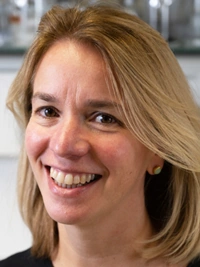 Ana Martin-Villalba studied medicine in Murcia, Spain and Leeds, UK and received her Ph.D. from the University of Heidelberg for investigating the role of death ligands in stroke. Thereafter she moved to the german cancer research center (DKFZ) where she further worked on devicing strategies for CNS repair following stroke, spinal cord injuries or chronic CNS disorders with a focus on the interaction of the innate immune system for activation of endogenous stem cells. Her research now centers in understanding stem cell behaviour in homeostasis, aging and disease including CNS-injuries and cancer, for which she has pioneered the application of single cell technologies.
Ana Martin-Villalba studied medicine in Murcia, Spain and Leeds, UK and received her Ph.D. from the University of Heidelberg for investigating the role of death ligands in stroke. Thereafter she moved to the german cancer research center (DKFZ) where she further worked on devicing strategies for CNS repair following stroke, spinal cord injuries or chronic CNS disorders with a focus on the interaction of the innate immune system for activation of endogenous stem cells. Her research now centers in understanding stem cell behaviour in homeostasis, aging and disease including CNS-injuries and cancer, for which she has pioneered the application of single cell technologies.
 Ana Martin-Villalba studied medicine in Murcia, Spain and Leeds, UK and received her Ph.D. from the University of Heidelberg for investigating the role of death ligands in stroke. Thereafter she moved to the german cancer research center (DKFZ) where she further worked on devicing strategies for CNS repair following stroke, spinal cord injuries or chronic CNS disorders with a focus on the interaction of the innate immune system for activation of endogenous stem cells. Her research now centers in understanding stem cell behaviour in homeostasis, aging and disease including CNS-injuries and cancer, for which she has pioneered the application of single cell technologies.
Ana Martin-Villalba studied medicine in Murcia, Spain and Leeds, UK and received her Ph.D. from the University of Heidelberg for investigating the role of death ligands in stroke. Thereafter she moved to the german cancer research center (DKFZ) where she further worked on devicing strategies for CNS repair following stroke, spinal cord injuries or chronic CNS disorders with a focus on the interaction of the innate immune system for activation of endogenous stem cells. Her research now centers in understanding stem cell behaviour in homeostasis, aging and disease including CNS-injuries and cancer, for which she has pioneered the application of single cell technologies.
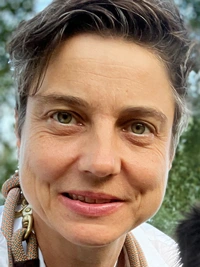 Olivia earned her PhD in Neuroscience from the Ruhr University Bochum, Germany. Originally trained as an electrophysiologist, she later expanded her expertise to optogenetics, protein design, circuits neuroscience, behavior and machine learning methods. After a reserach stay in the Laboratoire de Neurobiologie des Reseaux Sensorimoteurs, Université Paris Descartes, Paris, France, Olivia began her postdoctoral research in the lab of Stefan Herlitze and later became a junior group leader and assistant professor for advanced fluorescence microscopy at the Ruhr University Bochum. She then accepted a position as an associate professor for Synthetic Biology at the University of Bremen. Now, Olivia leads the Neuromodulatory Circuits Lab at the University of Cologne.
Olivia earned her PhD in Neuroscience from the Ruhr University Bochum, Germany. Originally trained as an electrophysiologist, she later expanded her expertise to optogenetics, protein design, circuits neuroscience, behavior and machine learning methods. After a reserach stay in the Laboratoire de Neurobiologie des Reseaux Sensorimoteurs, Université Paris Descartes, Paris, France, Olivia began her postdoctoral research in the lab of Stefan Herlitze and later became a junior group leader and assistant professor for advanced fluorescence microscopy at the Ruhr University Bochum. She then accepted a position as an associate professor for Synthetic Biology at the University of Bremen. Now, Olivia leads the Neuromodulatory Circuits Lab at the University of Cologne.
 Olivia earned her PhD in Neuroscience from the Ruhr University Bochum, Germany. Originally trained as an electrophysiologist, she later expanded her expertise to optogenetics, protein design, circuits neuroscience, behavior and machine learning methods. After a reserach stay in the Laboratoire de Neurobiologie des Reseaux Sensorimoteurs, Université Paris Descartes, Paris, France, Olivia began her postdoctoral research in the lab of Stefan Herlitze and later became a junior group leader and assistant professor for advanced fluorescence microscopy at the Ruhr University Bochum. She then accepted a position as an associate professor for Synthetic Biology at the University of Bremen. Now, Olivia leads the Neuromodulatory Circuits Lab at the University of Cologne.
Olivia earned her PhD in Neuroscience from the Ruhr University Bochum, Germany. Originally trained as an electrophysiologist, she later expanded her expertise to optogenetics, protein design, circuits neuroscience, behavior and machine learning methods. After a reserach stay in the Laboratoire de Neurobiologie des Reseaux Sensorimoteurs, Université Paris Descartes, Paris, France, Olivia began her postdoctoral research in the lab of Stefan Herlitze and later became a junior group leader and assistant professor for advanced fluorescence microscopy at the Ruhr University Bochum. She then accepted a position as an associate professor for Synthetic Biology at the University of Bremen. Now, Olivia leads the Neuromodulatory Circuits Lab at the University of Cologne.
 Neurophysiologist, with a strong interest in molecular and cellular biology, Julie Perroy obtained her PhD in 2001 at the University of Montpellier. Her work suggested that we cannot study the function of a receptor in isolation, but that we must consider its dynamic interactions with auxiliary proteins as signaling platforms (receptosome or functional unit). To overcome the lack of methods, she participated, as a postdoc at the University of Montreal in Michel Bouvier’s lab, in the technological developments of this pioneering laboratory to study of the temporal dynamics of protein-protein interactions in living cells. Appointed CNRS research fellow in 2004, then research director since 2012, she proposes biophysical developments to image, with subcellular resolution and in real time, the dynamics of protein-protein interactions and neuronal signaling involved in synaptic transmission and neuronal excitability. The work of her team and collaborators shows that receptor function at synapses is tightly controlled by its ability to engage in protein-protein interactions creating versatile functional nanodomains with specific effectors. In particular, Shank3-containing complexes control glutamate receptor function under physiological conditions and in psychiatric disorders such as Autism Spectrum Disorders. They are now implementing in vivo recording of cell signaling of neuronal ensembles in freely behaving mice, to understand how the molecular dynamics of synapses can control the functioning of neural networks and cognitive processes, in physiopathological conditions.
Neurophysiologist, with a strong interest in molecular and cellular biology, Julie Perroy obtained her PhD in 2001 at the University of Montpellier. Her work suggested that we cannot study the function of a receptor in isolation, but that we must consider its dynamic interactions with auxiliary proteins as signaling platforms (receptosome or functional unit). To overcome the lack of methods, she participated, as a postdoc at the University of Montreal in Michel Bouvier’s lab, in the technological developments of this pioneering laboratory to study of the temporal dynamics of protein-protein interactions in living cells. Appointed CNRS research fellow in 2004, then research director since 2012, she proposes biophysical developments to image, with subcellular resolution and in real time, the dynamics of protein-protein interactions and neuronal signaling involved in synaptic transmission and neuronal excitability. The work of her team and collaborators shows that receptor function at synapses is tightly controlled by its ability to engage in protein-protein interactions creating versatile functional nanodomains with specific effectors. In particular, Shank3-containing complexes control glutamate receptor function under physiological conditions and in psychiatric disorders such as Autism Spectrum Disorders. They are now implementing in vivo recording of cell signaling of neuronal ensembles in freely behaving mice, to understand how the molecular dynamics of synapses can control the functioning of neural networks and cognitive processes, in physiopathological conditions.
 Neurophysiologist, with a strong interest in molecular and cellular biology, Julie Perroy obtained her PhD in 2001 at the University of Montpellier. Her work suggested that we cannot study the function of a receptor in isolation, but that we must consider its dynamic interactions with auxiliary proteins as signaling platforms (receptosome or functional unit). To overcome the lack of methods, she participated, as a postdoc at the University of Montreal in Michel Bouvier’s lab, in the technological developments of this pioneering laboratory to study of the temporal dynamics of protein-protein interactions in living cells. Appointed CNRS research fellow in 2004, then research director since 2012, she proposes biophysical developments to image, with subcellular resolution and in real time, the dynamics of protein-protein interactions and neuronal signaling involved in synaptic transmission and neuronal excitability. The work of her team and collaborators shows that receptor function at synapses is tightly controlled by its ability to engage in protein-protein interactions creating versatile functional nanodomains with specific effectors. In particular, Shank3-containing complexes control glutamate receptor function under physiological conditions and in psychiatric disorders such as Autism Spectrum Disorders. They are now implementing in vivo recording of cell signaling of neuronal ensembles in freely behaving mice, to understand how the molecular dynamics of synapses can control the functioning of neural networks and cognitive processes, in physiopathological conditions.
Neurophysiologist, with a strong interest in molecular and cellular biology, Julie Perroy obtained her PhD in 2001 at the University of Montpellier. Her work suggested that we cannot study the function of a receptor in isolation, but that we must consider its dynamic interactions with auxiliary proteins as signaling platforms (receptosome or functional unit). To overcome the lack of methods, she participated, as a postdoc at the University of Montreal in Michel Bouvier’s lab, in the technological developments of this pioneering laboratory to study of the temporal dynamics of protein-protein interactions in living cells. Appointed CNRS research fellow in 2004, then research director since 2012, she proposes biophysical developments to image, with subcellular resolution and in real time, the dynamics of protein-protein interactions and neuronal signaling involved in synaptic transmission and neuronal excitability. The work of her team and collaborators shows that receptor function at synapses is tightly controlled by its ability to engage in protein-protein interactions creating versatile functional nanodomains with specific effectors. In particular, Shank3-containing complexes control glutamate receptor function under physiological conditions and in psychiatric disorders such as Autism Spectrum Disorders. They are now implementing in vivo recording of cell signaling of neuronal ensembles in freely behaving mice, to understand how the molecular dynamics of synapses can control the functioning of neural networks and cognitive processes, in physiopathological conditions.
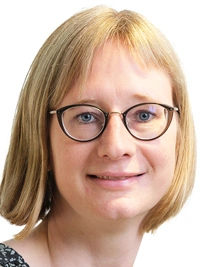 Inonge Reimert studied at the University of Groningen, the Netherlands. She obtained her MSc degree in Behavioural Cognitive Neurosciences in 2009 (with honours). Thereafter she did a PhD at the Adaptation Physiology group of Wageningen University, the Netherlands, from 2010 to 2014. The PhD project was focused on emotions, emotional contagion and social buffering in pigs. After her PhD, Inonge stayed at the Adaptation Physiology Group working as a researcher and teacher on pig behaviour. Currently, Inonge is working as an assistant professor at the Adaptation Physiology Group. Concerning research, Inonge co-supervises four PhD students working on tail biting in pigs, loose farrowing of sows, health and behaviour of calves, and resilience of pigs and cows. In addition, she is involved in several EU projects such as PigWeb, COST action LIFT and EUPAH&W. With regards to education, Inonge supervises several BSc and MSc students with their thesis, and lectures in MSc courses such as Health, Welfare and Management, Laboratory Animal Science and Applied Animal Behaviour and Welfare, and in post-academic courses such as the course Fundamentals of Animal Emotion and the course Welfare specialist in pig husbandry.
Inonge Reimert studied at the University of Groningen, the Netherlands. She obtained her MSc degree in Behavioural Cognitive Neurosciences in 2009 (with honours). Thereafter she did a PhD at the Adaptation Physiology group of Wageningen University, the Netherlands, from 2010 to 2014. The PhD project was focused on emotions, emotional contagion and social buffering in pigs. After her PhD, Inonge stayed at the Adaptation Physiology Group working as a researcher and teacher on pig behaviour. Currently, Inonge is working as an assistant professor at the Adaptation Physiology Group. Concerning research, Inonge co-supervises four PhD students working on tail biting in pigs, loose farrowing of sows, health and behaviour of calves, and resilience of pigs and cows. In addition, she is involved in several EU projects such as PigWeb, COST action LIFT and EUPAH&W. With regards to education, Inonge supervises several BSc and MSc students with their thesis, and lectures in MSc courses such as Health, Welfare and Management, Laboratory Animal Science and Applied Animal Behaviour and Welfare, and in post-academic courses such as the course Fundamentals of Animal Emotion and the course Welfare specialist in pig husbandry.
 Inonge Reimert studied at the University of Groningen, the Netherlands. She obtained her MSc degree in Behavioural Cognitive Neurosciences in 2009 (with honours). Thereafter she did a PhD at the Adaptation Physiology group of Wageningen University, the Netherlands, from 2010 to 2014. The PhD project was focused on emotions, emotional contagion and social buffering in pigs. After her PhD, Inonge stayed at the Adaptation Physiology Group working as a researcher and teacher on pig behaviour. Currently, Inonge is working as an assistant professor at the Adaptation Physiology Group. Concerning research, Inonge co-supervises four PhD students working on tail biting in pigs, loose farrowing of sows, health and behaviour of calves, and resilience of pigs and cows. In addition, she is involved in several EU projects such as PigWeb, COST action LIFT and EUPAH&W. With regards to education, Inonge supervises several BSc and MSc students with their thesis, and lectures in MSc courses such as Health, Welfare and Management, Laboratory Animal Science and Applied Animal Behaviour and Welfare, and in post-academic courses such as the course Fundamentals of Animal Emotion and the course Welfare specialist in pig husbandry.
Inonge Reimert studied at the University of Groningen, the Netherlands. She obtained her MSc degree in Behavioural Cognitive Neurosciences in 2009 (with honours). Thereafter she did a PhD at the Adaptation Physiology group of Wageningen University, the Netherlands, from 2010 to 2014. The PhD project was focused on emotions, emotional contagion and social buffering in pigs. After her PhD, Inonge stayed at the Adaptation Physiology Group working as a researcher and teacher on pig behaviour. Currently, Inonge is working as an assistant professor at the Adaptation Physiology Group. Concerning research, Inonge co-supervises four PhD students working on tail biting in pigs, loose farrowing of sows, health and behaviour of calves, and resilience of pigs and cows. In addition, she is involved in several EU projects such as PigWeb, COST action LIFT and EUPAH&W. With regards to education, Inonge supervises several BSc and MSc students with their thesis, and lectures in MSc courses such as Health, Welfare and Management, Laboratory Animal Science and Applied Animal Behaviour and Welfare, and in post-academic courses such as the course Fundamentals of Animal Emotion and the course Welfare specialist in pig husbandry.
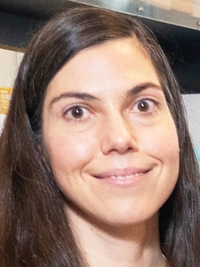 Professor Marie-Ève Tremblay is a Canada Research Chair in Neurobiology of Aging and Cognition and a Full Professor at the Division of Medical Sciences of the University of Victoria, British Columbia, Canada, since July 2023. She obtained her Ph.D. in Neurological Sciences at Université de Montréal in 2009. She has conducted postdoctoral training with Dr. Ania Majewska in Rochester, New York (2008-10) as well as with Drs. Giulio Tononi and Chiara Cirelli at the University of Wisconsin-Madison (2010-12). She started her first independent position at CRCHU de Québec-Université Laval in 2013, where she was Assistant Professor (2013-18) and Associate Professor (2018-20) of Molecular Medicine, as well as a Canada Research Chair in Neuroimmune Plasticity in Health and Therapy, before relocating to the University of Victoria as an Associate Professor at the Division of Medical Sciences (2020-23). Her research investigates the outcomes of various lifestyle and environmental influences on microglia, the immune cells of the brain, to design innovative treatment strategies for neurological disorders along the aging trajectory. She was ranked among the 1% most highly cited researchers by Clarivate in 2021, 2022, 2023, and 2024. She has been a College Member of the Royal Society of Canada since 2023.
Professor Marie-Ève Tremblay is a Canada Research Chair in Neurobiology of Aging and Cognition and a Full Professor at the Division of Medical Sciences of the University of Victoria, British Columbia, Canada, since July 2023. She obtained her Ph.D. in Neurological Sciences at Université de Montréal in 2009. She has conducted postdoctoral training with Dr. Ania Majewska in Rochester, New York (2008-10) as well as with Drs. Giulio Tononi and Chiara Cirelli at the University of Wisconsin-Madison (2010-12). She started her first independent position at CRCHU de Québec-Université Laval in 2013, where she was Assistant Professor (2013-18) and Associate Professor (2018-20) of Molecular Medicine, as well as a Canada Research Chair in Neuroimmune Plasticity in Health and Therapy, before relocating to the University of Victoria as an Associate Professor at the Division of Medical Sciences (2020-23). Her research investigates the outcomes of various lifestyle and environmental influences on microglia, the immune cells of the brain, to design innovative treatment strategies for neurological disorders along the aging trajectory. She was ranked among the 1% most highly cited researchers by Clarivate in 2021, 2022, 2023, and 2024. She has been a College Member of the Royal Society of Canada since 2023.
 Professor Marie-Ève Tremblay is a Canada Research Chair in Neurobiology of Aging and Cognition and a Full Professor at the Division of Medical Sciences of the University of Victoria, British Columbia, Canada, since July 2023. She obtained her Ph.D. in Neurological Sciences at Université de Montréal in 2009. She has conducted postdoctoral training with Dr. Ania Majewska in Rochester, New York (2008-10) as well as with Drs. Giulio Tononi and Chiara Cirelli at the University of Wisconsin-Madison (2010-12). She started her first independent position at CRCHU de Québec-Université Laval in 2013, where she was Assistant Professor (2013-18) and Associate Professor (2018-20) of Molecular Medicine, as well as a Canada Research Chair in Neuroimmune Plasticity in Health and Therapy, before relocating to the University of Victoria as an Associate Professor at the Division of Medical Sciences (2020-23). Her research investigates the outcomes of various lifestyle and environmental influences on microglia, the immune cells of the brain, to design innovative treatment strategies for neurological disorders along the aging trajectory. She was ranked among the 1% most highly cited researchers by Clarivate in 2021, 2022, 2023, and 2024. She has been a College Member of the Royal Society of Canada since 2023.
Professor Marie-Ève Tremblay is a Canada Research Chair in Neurobiology of Aging and Cognition and a Full Professor at the Division of Medical Sciences of the University of Victoria, British Columbia, Canada, since July 2023. She obtained her Ph.D. in Neurological Sciences at Université de Montréal in 2009. She has conducted postdoctoral training with Dr. Ania Majewska in Rochester, New York (2008-10) as well as with Drs. Giulio Tononi and Chiara Cirelli at the University of Wisconsin-Madison (2010-12). She started her first independent position at CRCHU de Québec-Université Laval in 2013, where she was Assistant Professor (2013-18) and Associate Professor (2018-20) of Molecular Medicine, as well as a Canada Research Chair in Neuroimmune Plasticity in Health and Therapy, before relocating to the University of Victoria as an Associate Professor at the Division of Medical Sciences (2020-23). Her research investigates the outcomes of various lifestyle and environmental influences on microglia, the immune cells of the brain, to design innovative treatment strategies for neurological disorders along the aging trajectory. She was ranked among the 1% most highly cited researchers by Clarivate in 2021, 2022, 2023, and 2024. She has been a College Member of the Royal Society of Canada since 2023.
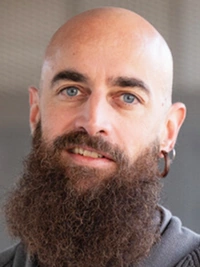 Pierre Trifilieff carries research aiming at understanding the fundamental mechanisms underlying symptomatic dimensions of psychiatric disorders, with a focus on the implication of dopamine signaling in deficits in executive functions and reward processing. He has notably demonstrated that low developmental n-3 polyunsaturated fatty acid biostatus leads to motivational deficits at adulthood due to an alteration of ventral striatal neuronal networks. He also recently established that imbalance in ventral striatum network can lead to obesity- or anorexia-like phenotypes.
Since 2022, Pierre Trifilieff has been leading a research group at the University of Bordeaux that studies the interaction between genes and environmental factors such as nutrition on the development of behavioral deficits relevant for the etiology of psychiatric disorders. He is also deputy director of the “Nanocoding” research consortium that gather 14 teams of the Bordeaux Neurocampus around the study of the nano-events that control neuronal function.
Pierre Trifilieff carries research aiming at understanding the fundamental mechanisms underlying symptomatic dimensions of psychiatric disorders, with a focus on the implication of dopamine signaling in deficits in executive functions and reward processing. He has notably demonstrated that low developmental n-3 polyunsaturated fatty acid biostatus leads to motivational deficits at adulthood due to an alteration of ventral striatal neuronal networks. He also recently established that imbalance in ventral striatum network can lead to obesity- or anorexia-like phenotypes.
Since 2022, Pierre Trifilieff has been leading a research group at the University of Bordeaux that studies the interaction between genes and environmental factors such as nutrition on the development of behavioral deficits relevant for the etiology of psychiatric disorders. He is also deputy director of the “Nanocoding” research consortium that gather 14 teams of the Bordeaux Neurocampus around the study of the nano-events that control neuronal function.
Pierre Trifilieff was a PI on numerous collaborative grants and was recently labelled “Equipe FRM” to study the impact of polymorphisms in enzymes involved in lipid metabolism in the etiology of psychiatric symptoms. He supervised 8 postdocs, 6 PhD thesis and more than 20 Master students.
 Pierre Trifilieff carries research aiming at understanding the fundamental mechanisms underlying symptomatic dimensions of psychiatric disorders, with a focus on the implication of dopamine signaling in deficits in executive functions and reward processing. He has notably demonstrated that low developmental n-3 polyunsaturated fatty acid biostatus leads to motivational deficits at adulthood due to an alteration of ventral striatal neuronal networks. He also recently established that imbalance in ventral striatum network can lead to obesity- or anorexia-like phenotypes.
Since 2022, Pierre Trifilieff has been leading a research group at the University of Bordeaux that studies the interaction between genes and environmental factors such as nutrition on the development of behavioral deficits relevant for the etiology of psychiatric disorders. He is also deputy director of the “Nanocoding” research consortium that gather 14 teams of the Bordeaux Neurocampus around the study of the nano-events that control neuronal function.
Pierre Trifilieff carries research aiming at understanding the fundamental mechanisms underlying symptomatic dimensions of psychiatric disorders, with a focus on the implication of dopamine signaling in deficits in executive functions and reward processing. He has notably demonstrated that low developmental n-3 polyunsaturated fatty acid biostatus leads to motivational deficits at adulthood due to an alteration of ventral striatal neuronal networks. He also recently established that imbalance in ventral striatum network can lead to obesity- or anorexia-like phenotypes.
Since 2022, Pierre Trifilieff has been leading a research group at the University of Bordeaux that studies the interaction between genes and environmental factors such as nutrition on the development of behavioral deficits relevant for the etiology of psychiatric disorders. He is also deputy director of the “Nanocoding” research consortium that gather 14 teams of the Bordeaux Neurocampus around the study of the nano-events that control neuronal function.
Pierre Trifilieff was a PI on numerous collaborative grants and was recently labelled “Equipe FRM” to study the impact of polymorphisms in enzymes involved in lipid metabolism in the etiology of psychiatric symptoms. He supervised 8 postdocs, 6 PhD thesis and more than 20 Master students.
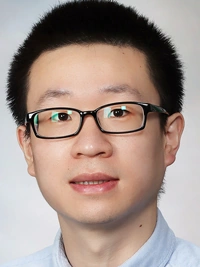 Dr. Yang You is currently an Assistant Professor at Department of Neuroscience, Mayo Clinic Florida. Dr. You earned his Ph.D. from Peking University with a major in Neurogenetics in 2017. He joined the laboratory at Boston University School of Medicine led by Dr. Tsuneya Ikezu as a postdoc and moved to Mayo Clinic Florida in April 2021, where he completed his postdoctoral training and has been investigating the molecular mechanism of Alzheimer’s disease pathogenesis using various transgenic and gene-targeted mouse models, and stem cells. His work has been currently published in the first-rated journals, such as Science Advances, Journal of Extracellular Vesicles, Molecular Psychiatry and Alzheimer’s Dementia. He has a significant expertise in tissue culture models of human stem cells and organoids, biochemical characterization of extracellular vesicles by mass spectrometry, super-resolution imaging and nano flow cytometry as well as molecular biological investigations of mouse models in neurodegenerative diseases.
Dr. Yang You is currently an Assistant Professor at Department of Neuroscience, Mayo Clinic Florida. Dr. You earned his Ph.D. from Peking University with a major in Neurogenetics in 2017. He joined the laboratory at Boston University School of Medicine led by Dr. Tsuneya Ikezu as a postdoc and moved to Mayo Clinic Florida in April 2021, where he completed his postdoctoral training and has been investigating the molecular mechanism of Alzheimer’s disease pathogenesis using various transgenic and gene-targeted mouse models, and stem cells. His work has been currently published in the first-rated journals, such as Science Advances, Journal of Extracellular Vesicles, Molecular Psychiatry and Alzheimer’s Dementia. He has a significant expertise in tissue culture models of human stem cells and organoids, biochemical characterization of extracellular vesicles by mass spectrometry, super-resolution imaging and nano flow cytometry as well as molecular biological investigations of mouse models in neurodegenerative diseases.
Dr. You’s research interests are focusing on elucidating the molecular mechanisms underlying Alzheimer's disease and other tauopathies, with a particular emphasis on the roles of cell-type specific extracellular vesicles and genetic factors in neuroimmunology by using stem-cell derived cell and 3D organoid models and disease-related mouse model. He is also interested in developing and establishing EV-based biomarkers and therapies for neurodegenerative diseases including Parkinson’s disease, AD and related dementia.
 Dr. Yang You is currently an Assistant Professor at Department of Neuroscience, Mayo Clinic Florida. Dr. You earned his Ph.D. from Peking University with a major in Neurogenetics in 2017. He joined the laboratory at Boston University School of Medicine led by Dr. Tsuneya Ikezu as a postdoc and moved to Mayo Clinic Florida in April 2021, where he completed his postdoctoral training and has been investigating the molecular mechanism of Alzheimer’s disease pathogenesis using various transgenic and gene-targeted mouse models, and stem cells. His work has been currently published in the first-rated journals, such as Science Advances, Journal of Extracellular Vesicles, Molecular Psychiatry and Alzheimer’s Dementia. He has a significant expertise in tissue culture models of human stem cells and organoids, biochemical characterization of extracellular vesicles by mass spectrometry, super-resolution imaging and nano flow cytometry as well as molecular biological investigations of mouse models in neurodegenerative diseases.
Dr. Yang You is currently an Assistant Professor at Department of Neuroscience, Mayo Clinic Florida. Dr. You earned his Ph.D. from Peking University with a major in Neurogenetics in 2017. He joined the laboratory at Boston University School of Medicine led by Dr. Tsuneya Ikezu as a postdoc and moved to Mayo Clinic Florida in April 2021, where he completed his postdoctoral training and has been investigating the molecular mechanism of Alzheimer’s disease pathogenesis using various transgenic and gene-targeted mouse models, and stem cells. His work has been currently published in the first-rated journals, such as Science Advances, Journal of Extracellular Vesicles, Molecular Psychiatry and Alzheimer’s Dementia. He has a significant expertise in tissue culture models of human stem cells and organoids, biochemical characterization of extracellular vesicles by mass spectrometry, super-resolution imaging and nano flow cytometry as well as molecular biological investigations of mouse models in neurodegenerative diseases.
Dr. You’s research interests are focusing on elucidating the molecular mechanisms underlying Alzheimer's disease and other tauopathies, with a particular emphasis on the roles of cell-type specific extracellular vesicles and genetic factors in neuroimmunology by using stem-cell derived cell and 3D organoid models and disease-related mouse model. He is also interested in developing and establishing EV-based biomarkers and therapies for neurodegenerative diseases including Parkinson’s disease, AD and related dementia.